

How to Write a Profile Essay
- Posted 21 November 2020
- By StudySaurus
- Under Essay Writing
- Discover a remarkable subject to write a profile essay about. The person can be well-known or somewhat ordinary. The subject is not limited to an individual but can be a location, leisure interest, or occupation. Expand your search beyond the computer and your neighborhood. Do primary source research on the subject to acquire background information. Go to the library and view back issues of local or regional newspapers and other rags or scan online sources.
- Develop a loose outline based on the subject of your essay. Jot down the header, “Introduction.” Start listing possible details that will be disclosed later from interviews. Title another header as “Body” and note high points that will become the possible climax of the essay. Tie it all up in the “Conclusion” header and brainstorm solid ending possibilities.
- Compose a list of specific interview questions. They should be open-ended but specific and relevant to your essay. Questions should draw out information not commonly known about the person. Make a list of possible interviewees to broaden the narrative for a multifaceted profile. This includes others in his or her circle or individuals linked to a location or activity.
- Conduct the interview in a distraction-free zone. Establish a rapport early on to make the interviewee feel comfortable, which will churn out a more productive interview. Lay down a basic groundwork of what topics will be covered, the length of time needed, and the importance of the interview. Next, advance to the main interview. Be sure to take meticulous notes or get permission to tape the interview to transcribe later.
- Jot down any observations immediately following the interview. Consider the individual’s habits, attitude, and other qualities that were observed. Transcribe and rearrange the interview questions to recount an interesting personal perspective or interpretation. This will become your rough draft.
- Revise the draft, incorporating important details and factual incidents that were initially missed. Start with an attention-grabbing lead sentence. Ensure that the beginning grabs the reader and pulls him in. Intrigue your audience with an informative main section. Stay focused on your intended approach until the essay’s conclusion, which should give readers a closing impression of the subject and summarize your overall objective.
- Read the essay aloud. Did you give a visual portrayal? Check that you interweaved dialogue, added physical descriptions in moderation, but used narrative freely.
Tips to Write a Profile Essay
A profile essay vividly presents a subject to the readers. The writing is a combination of objective and expressive: While presenting his observations and analysis to inform the reader, the writer also brings his own personal perspective and interpretations to the essay. A profile essay differs from biographical and autobiographical writing in that it takes newly acquired observation, through research or firsthand accounts; an autobiography or biography is about remembered experiences. The challenge of a profile essay is to gather the information and give it shape in an essay that conveys a main idea; there are several guidelines to aid a writer in doing this.
Choose the Subject Wisely
While profiles of exciting, controversial people are always interesting, even the mundane can be intriguing if the writer examines it closely and offers a distinctive perspective. A writer shouldn’t overlook the quietly remarkable person who seems ordinary on the outside.
Form an Engaging and Informative Plan
A profile essay will most likely be based on at least one interview with the subject, and may also include interviews with those that know the subject. Writers should resist the temptation to organize the essay in the order they ask the questions, as this can make for boring reading. Instead, the answers of the questions should be examined closely for an emerging image of the subject. The responses can then be incorporated into a more complex picture of the subject.
Provide a Vivid Description
A quality profile essay should incorporate a vivid word picture of the subject. Include specific details, such as how the subject looks, talks, dresses, smells and is motivated. Keep straight description, or just cataloging the obvious, to a minimum; instead, use description to give the sense that the subject’s outward appearance reveals inward character traits. Information from others in the essay should serve to describe the subject and not take on its own life.
Convey a Dominant Impression
A profile essay should convey a dominant impression of the subject: the writer’s personal interpretation and insight on the subject and what the writer has gained from observing and researching. Carefully select and arrange details so that they communicate your attitude. This interpretive element is what categorizes the profile essay as a genre and separates it from other forms of narrative and descriptive writing, such as the biography.
Profile Paper Example
“Good evening, Valparaiso. I’m storm shield meteorologist Jacob Van Horn here with a look at your forecast.” Ever since Jake was in grade school, he knew that he wanted to be a meteorologist. However, it wasn’t until high school that he realized his dream could truly become reality. Jake’s interest in weather began when he first watched the movie “Twister,” a collection of National Geographic documentaries provided by his school. With an abundance of hard work and dedication, Jake is working towards earning his bachelor’s degree in meteorology and achieving his dream of becoming a meteorologist.
Since Jake has always been an admirer of the weather, severe storms always brought him a thrill. His interest in weather peaked after an F-4 tornado struck a city near his home in November of 2002. His family drove through Van Wert, Ohio, to see the damage. “Those images will always be in my head,” he recalls.
Although Jake always knew that he wanted to become a meteorologist, it was not until high school when he recognized his full potential. He realized how good he was at science and math and how much he enjoyed each of these subjects. Math and science are a crucial part of meteorology; therefore, Jake decided to “give it a go.”
When it came to deciding upon a college to pursue his meteorology degree, Jake was torn between Purdue University and Valparaiso University. Both schools possessed a great meteorology program, but Jake was drawn to Valparaiso’s small school atmosphere and location. Although Valparaiso was a private university with higher tuition than Purdue, Jake received a presidential scholarship, which aided in paying for his tuition. Getting accepted into a college with an outstanding meteorology program brought Jake one step closer to achieving his dream.
Once college started, there were a broad range of meteorology classes that he had to take. They started as simple, introductory classes and progressed into much more specific classes, such as an aviation weather class to predict things such as turbulence and a tropical class, which not only focuses on hurricanes and tropical storms, but the impact of the ocean on the weather in general. These classes will be beneficial to his future career choice. A meteorologist’s job can be described as making a type of educated prediction. Jake will use what he has learned in his classes, apply that broad knowledge to whatever is happening in the forecast, look at where the weather is coming from, and predict what he believes will happen.
The summer between his freshman and sophomore years of college, Jake was an intern at a local news station, WANE 15. While at his internship, he often assisted the head meteorologist in creating graphics that were used on television. He liked using the graphics system to see what he could create and he also liked communicating to the people about what was going to be happening. Jake said that he was able to learn an abundance of new things that will be useful in his future endeavors. One night, during a large tornado outbreak, he stayed at the station until around 2AM, keeping the viewing areas informed about the potentially dangerous weather conditions. He said that it “was definitely a crazy night.”
When he returned back to campus his sophomore year, Jake was a lab aide for an introductory class, which helps to refresh students on the basics of meteorology. He was also an assistant weather director at the campus television station, which is helping him learn about the broadcasting side of meteorology. He has learned everything from production to graphic-making and even presentation skills on the green screen. Although he did not think he would like being on television, before he began classes, Jake has learned many skills that have opened his mind to the world of broadcasting.
About StudySaurus
Community. knowledge. success..
StudySaurus is run by two uni-students that still get a kick out of learning new things. We hope to share these experiences with you.
Ideas , concepts , tutorials, essay papers – everything we would’ve liked to have known, seen or heard during our high-school & UNI years, we want to bring to YOU.
Privacy & Cookies Policy Terms and Conditions DMCA Request

Profile Essay
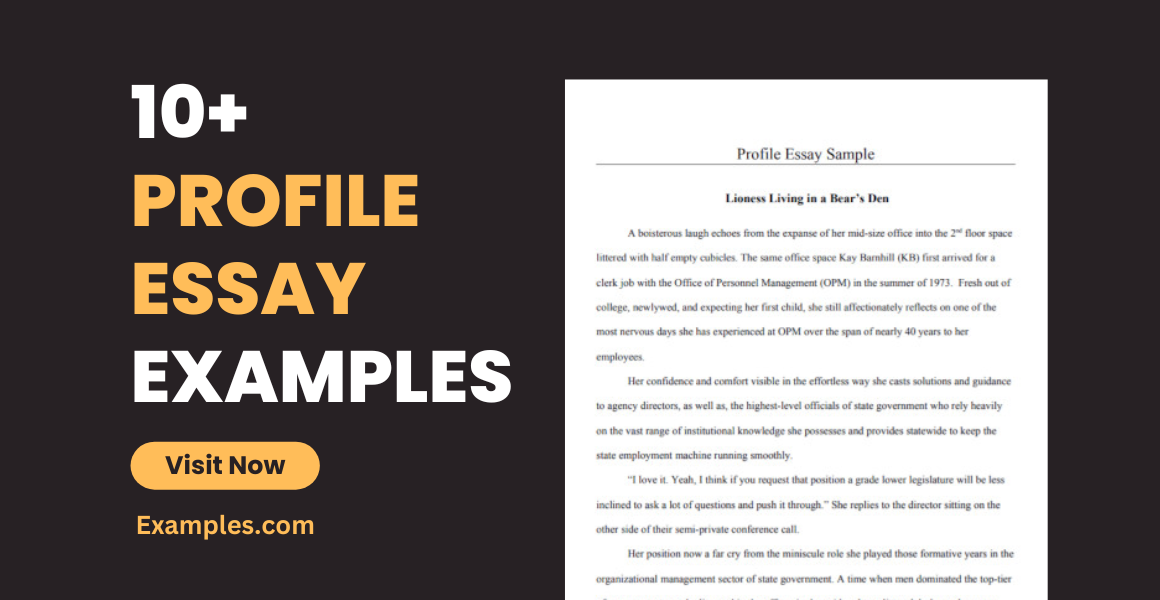
Let’s take a look at a profile essay. In order to understand what it means, you may allow yourself to engage in an interview where you are able to read a person’s autobiography . As you go long into this article, you will be able to know more about what a profile essay is and how to write a good profile essay.
10+ Profile Essay Examples
1. composition courses profile essay.
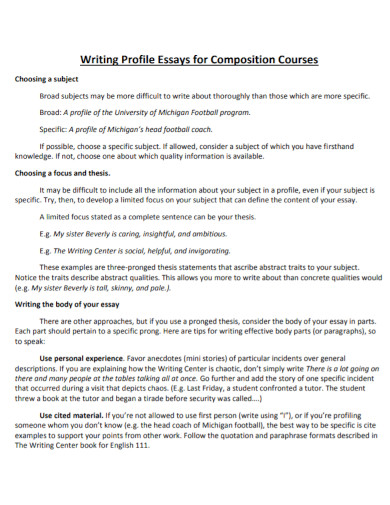
Size: 322 KB
2. Profile Essay of a Soldier
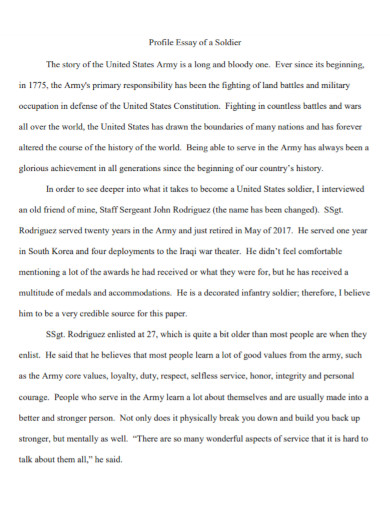
Size: 112 KB
3. Profile of a Good Essay
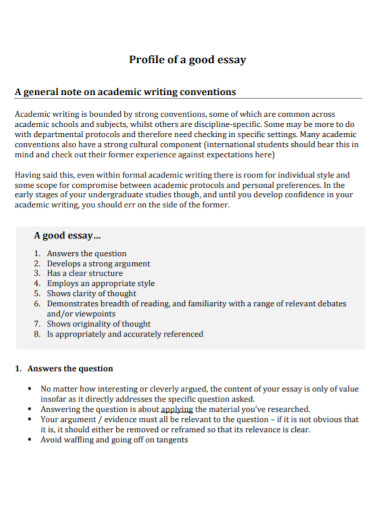
Size: 374 KB
4. Proficiency Profile Essay
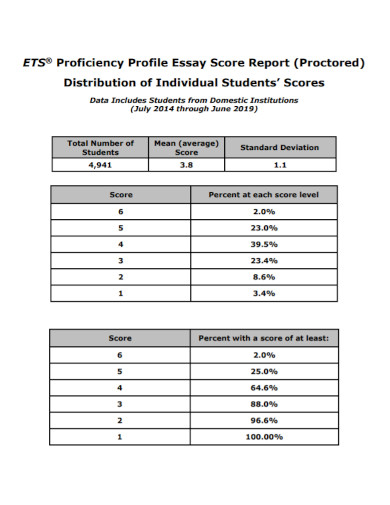
Size: 238 KB
5. Profile in Courage Essay Contest
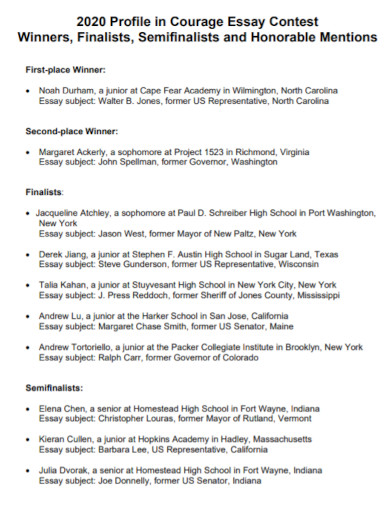
Size: 21 KB
6. Checklist for the Profile Essay
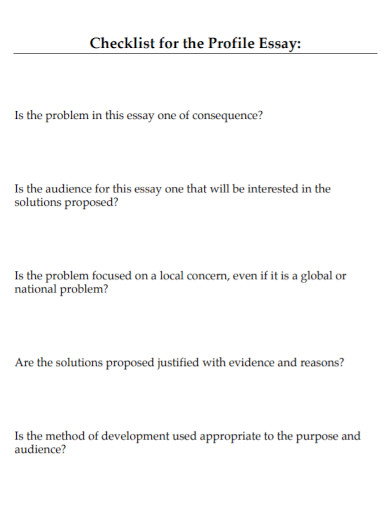
Size: 45 KB
7. Student Writing Profile Essay
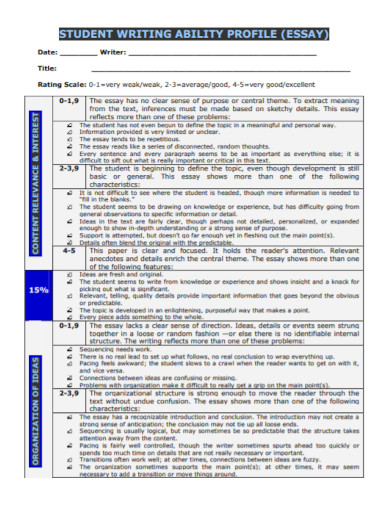
Size: 108 KB
8. Profile of an Expository Essay
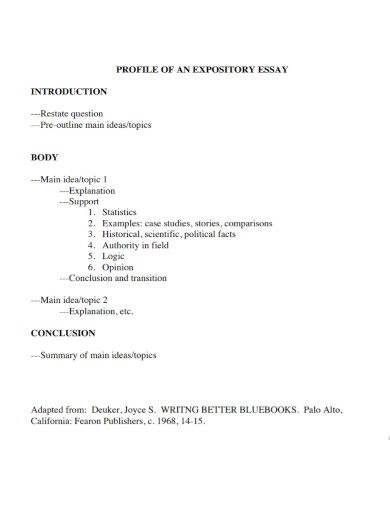
Size: 33 KB
9. Profile Essay Example
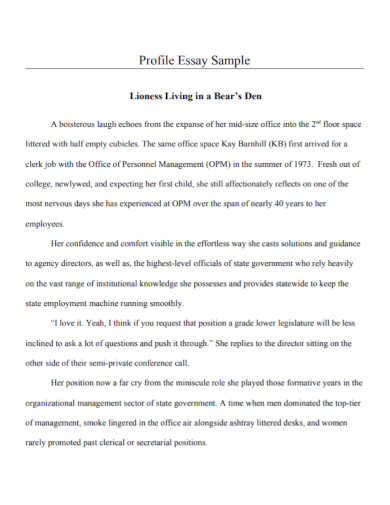
Size: 52 KB
10. Interview Profile Essay
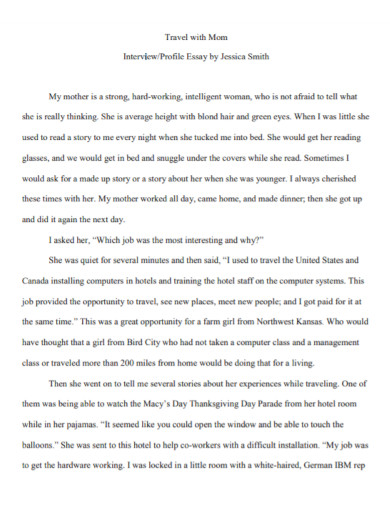
Size: 75 KB
11. Composition Profile Essay
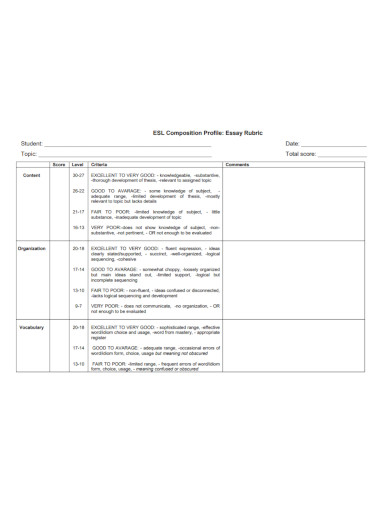
Size: 53 KB
What is a Profile Essay?
A profile essay is a form of literary writing that tells about a person, place or event. This is intended to provide a detailed profile of something that offers every reader to make a certain perspective or judgment over a subject. This is different from a descriptive essay. It does not only entails description of a subject, rather it is designed to answer questions to identify something.
How to Start Writing a Profile Essay?
Step 1: get the right information.
Doing research is the most important thing to do before you begin writing your research profile. This will help you get a detailed information about your subject. Always make sure that you are using trusted sources like library materials, online articles, etc.
Step 2: Validate Your Information
Check the release date of an article as well as have comprehensive the contents are. Avoid getting information from outdated sources.
Step 3: Outline Your Essay
Always prepare with you a profile essay outline. Essay outlines help in making it easier for you to pinpoint the first idea and what should follow next. This will help you organize your gathered data appropriately.
Step 4: Revise or Proofread Your Profile Essay
Once you have followed the three steps meticulously, you are also well aware that you will need to revise anything that needs to be revised. This includes proofreading any mistakes you may have made throughout. In order to present a good profile essay, you must also make sure it is presentable. No erasures and no mistakes as much as possible.
Do we still have to apply writing style in making a profile essay?
It is advisable to practice yourself to pay attention with the tone and style of your essay. This will make your piece engaging and interesting to read.
What is the purpose of making a profile essay?
The purpose of an essay is to give the readers a full description of your chosen topic. Aside from that, it is also for you to be able to express something about the subject, may it be an argument in response to a certain issue or question and on what you have learned about it. You may also use an essay to persuade your readers that your stand is reasonable.
What to do when picking for the right title of your essay?
Think about what you want to make in your essay. You should reflect on the main idea of your essay. Make it as the basis of creating a unique title for your piece.
What are some things to consider when choosing a subject for profile essay?
You should always choose a reasonable subject and don’t forget to research something about it.
What are the elements of a profile essay?
The elements of a profile essay starts with the introduction paragraph , followed by the body of the paragraph, and ends with the conclusion paragraph .
Before we are able to learn how to do essay writing , we always seek for mastery skills in it. We all know that an essay is composed of the three basic parts namely the introduction, body paragraph, and the conclusion. You may see examples from different essays like argumentative essay , informative essay , career essay and more.
Profile Essay Generator
Text prompt
- Instructive
- Professional
Write a Profile Essay on a community leader who has made a difference in your area.
Discuss the achievements and challenges of a local entrepreneur in your Profile Essay.
Put a stop to deadline pressure, and have your homework done by an expert.
How To Write A Profile Essay Like A Professional Writer

Welcome to our blog, where we embark on a journey to master the art of writing profiles essays. Whether you’re a high school or college student, understanding the critical components of a profile essay is essential for academic success. In this comprehensive guide, we will delve into the definition of a profile essay and provide practical tips, example of a profile essay, and expert advice to help you excel in this form of writing.
A profile essay is a captivating narrative that enables students to explore the lives and experiences of individuals. Through vivid descriptions and engaging storytelling, these essays offer readers a glimpse into the unique qualities and perspectives of the profiled subjects. By mastering the fundamentals of this writing style, you can effectively communicate your observations and insights, creating compelling and informative profiles.
In our blog, we will discuss the essential elements of a profile essay and emphasize the importance of high-quality writing and the benefits of expert guidance. Whether you’re a student aiming to improve your writing skills or a teacher seeking to enhance your students’ abilities, this guide is designed to provide you with the necessary tools and techniques to create exceptional profiles.
Join us on this enriching journey, where we share valuable knowledge, practical profile essay examples, and insider tips, empowering you to produce outstanding profile essays. Let’s unlock the secrets of this unique form of writing and achieve fast, awesome results together.
Table of Contents
What is a profile essay, how to start a profile essay, profile essay structure guides, key considerations for writing engaging profile essays, crafting an outstanding profile essay: essential tips, profile essays in academic settings.
A profile essay is not just a collection of facts and figures; it is a powerful literary piece that delves deep into the essence of a person, place, or event. This form of writing goes beyond surface-level descriptions to create a vivid and engaging portrayal that captivates readers emotionally.
When crafting a profile essay outline, the writer aims to explore a specific individual’s life, personality, experiences, achievements, or unique qualities of a place or event. It seeks to paint a comprehensive picture, offering readers a window into the subject’s world and allowing them to connect with it on a deeper level.
A well-written profile essay immerses the reader in the subject’s experiences, thoughts, and emotions by employing descriptive language, storytelling techniques, and insightful observations. It evokes empathy and understanding, enabling readers to forge a connection and gain a deeper appreciation for the person, place, or event being portrayed.
In summary, a profile essay is a literary work that aims to go beyond superficial details and statistics. It is a means of conveying the essence of a subject through engaging storytelling, providing readers with a rich and immersive experience that leaves a lasting impact.
The beginning of a profile essay is vital in capturing the reader’s attention and setting the tone for the rest of the piece. It requires careful consideration and strategic planning to ensure a strong start. Here are a few practical ways how to write a good profile essay:
- Look for unique qualities: Seek out subjects with unique backgrounds, experiences, or achievements. These aspects can add depth and intrigue to your profile essay.
- Consider relevance: Choose a subject relevant to your intended audience or the purpose of the assignment. This will help create a stronger connection and interest among your readers.
- Interview your subject: Reach out to the individual you are profiling and request an interview. Prepare a thoughtful question list about their life, experiences, and perspectives. These interviews will provide invaluable insights and personal anecdotes that can enhance the depth of your essay.
- Read articles and books: Explore articles, books, and other publications related to your subject. This will provide a broader context and enable you to include relevant background information in your profile essay.
- Explore online sources: Utilize reputable online sources such as websites, blogs, and academic databases to gather additional information and perspectives on your subject. Be critical of your authorities and ensure they are credible and reliable.
- Be concise and specific: State your main argument or the central theme of your profile essay clearly and concisely.
- Make it captivating: Use language that captures the reader’s attention and creates intrigue. A compelling thesis statement will generate interest and encourage readers to continue reading.
- Provide a roadmap: Your thesis statement should act as a roadmap for your essay, indicating the main points or areas of focus you will cover. This helps readers understand the structure and flow of your essay.
Starting a profile essay requires careful consideration of the subject, thorough research, and a well-crafted thesis statement. Choosing an intriguing topic, conducting a comprehensive analysis, and formulating a solid thesis statement can captivate your readers and set the stage for a compelling and informative profile essay. Remember, the start of your essay sets the tone for the entire piece, so invest time and effort into crafting a high quality and strong opening that engages and intrigues your readers.
Writing a profile essay requires a structured approach combining storytelling and factual information. Follow these steps to create a well-crafted profile essay:
- Introduction: Begin your essay with a compelling opening sentence that hooks the reader. Provide some background information about the subject and introduce the main thesis statement.
- Body Paragraphs: Divide your essay into multiple paragraphs, each focusing on a specific aspect or theme related to the topic. Use a mix of narrative storytelling and factual information to engage the reader. Include anecdotes, quotes, and descriptions to bring your subject to life.
- Organization and Flow: Ensure a logical progression from one paragraph to another. Use transitional phrases to maintain the coherence of your essay. Consider arranging your sections thematically or chronologically, depending on what suits your subject best.
- Descriptive Language: Incorporate vivid and descriptive language to create a sensory experience for the reader. Use specific details and imagery to make your subject come alive.
- Conclusion: Summarize the main points discussed in your essay and leave the reader with a lasting impression. Reflect on the significance of your topic and its impact on the reader.
A profile essay offers a comprehensive portrayal of a person or place, providing readers with a detailed understanding of the subject. Whether it’s about a place or a person, crafting an engaging profile essay requires careful planning and effective storytelling. Here are some key steps to consider:
How to Write a Profile Essay on a Place:
Choose an intriguing place: Select a location that is unique and holds significance for the readers. Observe and research: Immerse yourself in the place, exploring its history, culture, and physical aspects. Structure your essay: Begin with an engaging introduction, describe the place vividly, and provide personal insights. Incorporate sensory details: Utilize descriptive language to appeal to the readers’ senses. Conclude with a reflection: Share your overall impression and highlight the significance of the place.
How to Write a Profile Essay on a Person:
Select a captivating individual: Find someone with an interesting background, achievements, or experiences. Conduct interviews: Engage in in-depth conversations to gather firsthand information about the person. Organize your essay: Begin with an attention-grabbing introduction, present the person’s background and accomplishments, and delve into their personality traits and influences. Use anecdotes and examples: Illustrate the person’s characteristics through real-life stories and specific instances. Wrap up with a reflection: Offer your personal insights, reflect on the person’s impact, and conclude with a memorable ending.
Remember, in both types of profile essays, it is crucial to maintain a balanced blend of factual information and compelling storytelling to engage readers and leave a lasting impression.

When writing a profile essay, it’s essential to remember key elements that will enhance the quality of your work. Here are some essential tips to help you craft an outstanding profile essay:
- Choose an Engaging Format: While there is no strict format for a profile essay, you can structure it to suit your subject and the narrative you want to create. You can opt for a chronological structure, a thematic approach, or a combination of both.
- Conduct Thorough Interviews: Interviews are crucial in gathering firsthand information about your subject. Prepare a list of relevant questions and conduct interviews with the subject and individuals associated with them. These interviews will enrich your profile essay with unique insights and personal anecdotes.
- Focus on Descriptive Details: Pay attention to descriptive details to bring your subject to life. Use sensory language to create a vivid picture in the reader’s mind. Describe the subject’s appearance, gestures, and mannerisms. Include details about the environment, sounds, and smells to transport the reader to the scene.
- Utilize Direct Quotes: Direct quotes from your subject and others you interview add authenticity and credibility to your profile essay. Use quotes to highlight important points or capture the subject’s voice and perspective.
- Show, Don’t Tell: Rather than simply stating facts, show the reader the subject’s personality, values, and experiences through storytelling. Engage the reader’s emotions by narrating impactful moments or sharing significant events that shaped the subject’s life.
- Revise and Edit: Once you have completed your profile essay’s first draft, revise and edit it. Check for clarity, coherence, and grammar errors. Trim unnecessary information and ensure a smooth flow of ideas. Consider seeking feedback from peers or instructors to gain valuable insights.
Profile essays are commonly assigned in various academic settings, including high school, college, and university. These assignments allow students to develop their research, writing, and storytelling skills while exploring diverse subjects and honing their analytical thinking.
Following Guidelines:
When working on a profile essay for school or college, it’s crucial to follow the guidelines provided by your instructor. This ensures that you stay on track and meet the assignment requirements. Consider the following points:
- Pay attention to specific requirements: Your instructor may provide instructions regarding length, formatting, citation style, and other essential details. Make sure to adhere to these guidelines to avoid any penalties.
- Understand the objectives: Familiarize yourself with the purposes of the assignment. This will help you shape your essay and focus on the key aspects your instructor wants you to explore.
- Align with learning outcomes: Consider how the profile essay fits into the broader learning outcomes of the course. This will enable you to approach the assignment with a clear understanding of its purpose and relevance.
Seeking Assistance:
If you struggle with the assignment or need extra support, online essay assignment help and custom writing services are available. These services offer expert guidance and assistance, ensuring you receive high-quality, well-crafted profile essays that meet your academic requirements. Here are some key points to consider:
- Online homework helpers: These platforms connect you with knowledgeable tutors who can guide and answer your questions about profile essay writing. They can offer valuable insights and help you overcome challenges you may encounter.
- Custom writing services: If you feel overwhelmed or lack time to complete the assignment, custom writing services can be a viable option. These services employ professional writers who can create custom profile essays tailored to your needs and requirements. However, it’s essential to choose a reputable and trustworthy service to ensure the quality and originality of the work.
Profile essays in academic settings offer students a valuable opportunity to develop their research, writing, and storytelling skills. By following the guidelines provided by your instructor and seeking assistance when needed, you can ensure that your profile essays meet the objectives of the assignment and align with the course’s learning outcomes. Remember, practice and persistence are crucial to mastering the art of writing compelling and informative profile essays.
Get Profile Essay Writing Help Today!
Mastering the art of writing a profile essay requires a combination of skill, guidance, and support. By following the guidelines and tips provided by experts, you can create captivating profiles that engage and resonate with your readers. Along the way, it’s essential to seek assistance when needed, and fortunately, there are affordable options available that provide class-leading customer support.
When embarking on the journey of writing a profile essay, remember to choose an intriguing subject and conduct thorough research to ensure the accuracy and depth of your piece. Craft a strong thesis statement that serves as a roadmap for your essay, guiding your readers through the main aspects you’ll be exploring.
In the process, it’s reassuring to know that expert guidance and support are accessible. Whether you require assistance structuring your essay, some college assignment help , or understanding the nuances of profile essay writing, affordable online platforms provide the expertise you need. These platforms offer friendly customer support to address your queries and provide valuable insights, ensuring you receive the guidance necessary to excel in your writing endeavors.
By availing yourself of these resources, you can enhance your profile essay writing skills, boost your confidence, and achieve outstanding results. So, embrace the art of writing profiles backed by expert guidance, affordable options, class-leading support, and friendly assistance. Let your words paint vivid portraits and create lasting connections with your readers through the power of the profile essay.
What is a profile essay, and what is its purpose?
A profile essay is a type of academic or journalistic writing that aims to provide a detailed description and analysis of a particular person, place, event, or organization. Its purpose is to present a comprehensive and engaging portrayal of the subject, highlighting its unique qualities, experiences, and significance.
How do I choose a suitable subject for my profile essay?
When selecting a subject for your profile essay, consider individuals, places, or events that possess distinct characteristics, have a compelling story, or hold relevance in a specific context. It could be a notable figure in your community, a memorable travel destination, or an event with cultural significance. The key is to choose a subject that allows for rich exploration and offers an opportunity to captivate your readers.
What are the essential elements to include in a profile essay?
A profile essay typically includes several key elements to portray the subject comprehensively. These elements may include a vivid and engaging introduction, background information, descriptive details, anecdotes, quotes, and personal observations. It is important to capture the subject’s personality, experiences, and significance through a well-structured narrative that keeps the reader engaged.
How can I ensure the accuracy and credibility of the information in my profile essay?
To maintain accuracy and credibility in your profile essay, conducting thorough research and gathering information from reliable sources is crucial. This can involve interviewing the subject, conducting background research, and seeking multiple perspectives. Always verify the information you gather and cross-reference it with trustworthy sources to ensure the accuracy of your content. Remember to attribute any quotes or specific details to their respective sources.

Get on top of your homework.
Leave a Reply Cancel reply
Your email address will not be published. Required fields are marked *
How to Write a Profile Essay (+ Examples to Check)
In the article, you’ll find the profile essay definition and structure. Several examples are also here to help you see how to create a brilliant one.
What is a Profile Essay?
Such papers have two primary goals:
- Stay informative
- Provide as many exciting details about the subject as possible
Another essential detail is that you shouldn’t stray from the topic. Mention only the relevant things, and don’t be afraid to keep the focus as narrow as possible.
That’s the point of any profile essay.
Profile Essay Example
Profile essays look personal, but their style is matter-of-fact and academic. It seems challenging, but you can do that with appropriate examples at hand.
There are two common types of such papers: on a person and a place . Since each has its specifics, let’s jump right into the samples!
Profile essay example on a person
Lucky you are when a professor assigns an essay about yourself. After all, it’s a person you know best, right? When writing about someone else, the key is to treat them how you’d treat yourself if you wrote your story.
Here’s an example of a profile essay on a person :
Profile essay example on a place
Another profile paper is the one describing a specific location. It can include its history, spots, and the famous people who visited it.
Choose the places you find exciting, but consider how much information you can dig up. Remember that a stellar profile essay must be informative. Put your emotions about what you’re describing aside. Example:
How to Write a Profile Essay: Outline and Tips
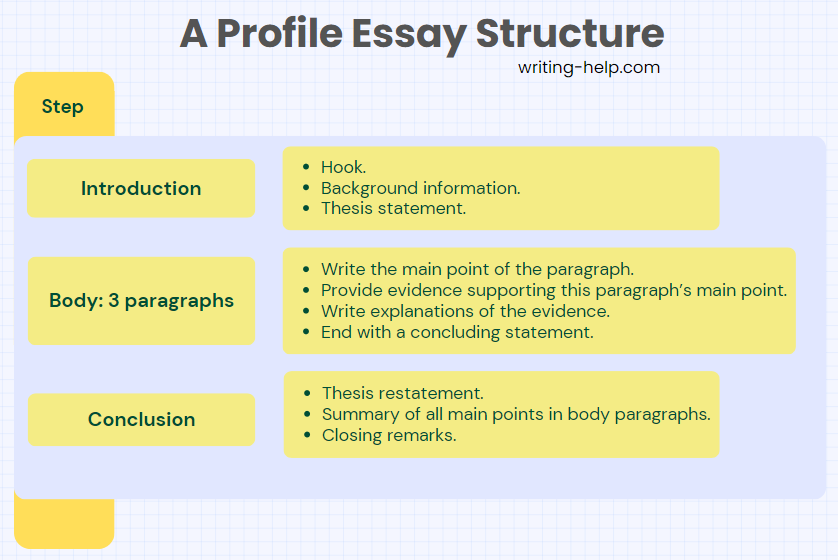
One of the profile essay challenges is making it long enough to meet the word count.
You can do it through research and adding extra info during the writing process. Imagine you’re a detective compiling a case file!
More details:
Craft a profile essay outline before writing. It’s a plan for an intro, a body, and a conclusion [1]. Important: Outline the thesis and topic sentences for each paragraph. That way, you’ll get a template for your essay to fill in with relevant information.
How to start a profile essay
The best way to start your essay is a so-called attention grabber. Tell the most intriguing fact about your topic and elaborate on it in the following sentence.
As a finishing touch, focus on a thesis statement. That last sentence reveals all the details you’ll discuss in the upcoming paragraphs.
Body paragraphs
You need several main points, whether writing about a personality or describing a location. Derive topic sentences (your paragraphs’ first sentences) from research and make them informative.
The last sentence of each section should be a transition to the next one. It will make your essay easy to read.
Writing a profile essay conclusion
Unlike an interview or expository essay , your conclusion restates the thesis and summarizes the core info from your paper.
While it sounds simple, this part of your paper is the most significant. Ensure you end it with a relevant sum-up.
Practical tips on writing profile papers
Profile papers are all about research and editing your essay to perfection. Below are three fruitful tips [2] on how to do that.
- Use a reference finder . This tool works like a filter, removing all irrelevant sources from your search. It will help you invest less time in finding the materials you need.
- Spend several hours resting before editing your paper . If you look for mistakes in your essay right after you’ve finished the draft, you’re likely to miss them. Give your brain time to refocus, and you’ll find more typos and inconsistencies.
- Ask parents or friends how informative it is . If unsure about how your paper turned out, ask someone who doesn’t know much about the topic. If they find your draft engaging, it’s a success.
Bonus: Profile Essay Topics Ideas
If a tutor doesn’t provide a specific topic for your profile essay and you struggle to find one, try any of these:
- My Hometown’s History: The Hero of People
- The Writer Who Shaped My View of Life
- The Best Five-Star Hotel In Our Country
- An Unusual Millionaire With a Kind Heart
- A Touching Story of a Famous Animal
- My Favorite Painter: A Biography
- My Favorite Touristic Location
- The Spookiest Location I’ve Ever Visited
- The Teacher Who Was My Role Model
- The Landmark I’ll Never Forget
- My Pet Animal: Facts and Stories
- My Hero: The Person I Want to Become
- The Most Impressive Water Body I’ve Seen
- The Place I Dream to Visit
- The Fictional Character I Learned Most From
Profile essays can be challenging. Yet, they’re great for training your writing and research skills. You pay attention to details so that a text flows and presents information logically.
It’s okay if you don’t create a masterpiece on your first try. Just remember to have fun in the process.
References:
- https://www.adelaide.edu.au/english-for-uni/essay-writing
- https://www.wccnet.edu/webfiles/writing-center/web/essay-structures/ProfileEssay.pdf
- Essay samples
- Essay writing
- Writing tips
Recent Posts
- Writing the “Why Should Abortion Be Made Legal” Essay: Sample and Tips
- 3 Examples of Enduring Issue Essays to Write Yours Like a Pro
- Writing Essay on Friendship: 3 Samples to Get Inspired
- How to Structure a Leadership Essay (Samples to Consider)
- What Is Nursing Essay, and How to Write It Like a Pro
- Apply to UBC
- Canadian high school students
- International high school students
- International Baccalaureate students
- Advanced Placement students
- University or college transfer students
- Mature students
- Academic English development programs
- UBC Conditional Admission Program
- UBC-Langara Indigenous Transfer Partnership
- Plan for UBC
- Choose what to study
- First-year credit
- Write your personal profile
- Complete the application
- Disability-related considerations
- Submit your documents
- First-year study options
- Accept your offer
- Apply for a study permit
- Plan your finances
- Find a place to live
- Take care of your health and wellness
- Explore your academic options
- Plan your degree
- Register for your courses
- Get ready for UBC life
- What we look for
- Dates and deadlines
- How UBC determines your tuition fees
- What will your first year cost?
- Beyond Tomorrow Scholars Program
- Indigenous student awards
- Loran Awards
- Presidential Scholars Awards
- Schulich Leader Scholarships
- UBC Centennial Scholars Entrance Awards
- International Scholars
- Loans for Canadian and US students
- Awards for students with disabilities
- Funding for former youth in care
- Funding for veterans
- Financial schedule
- Living in residence
- Living off campus
- Interdisciplinary and innovative programs
- Sports and recreation
- Work programs
- Leadership and volunteering
- Clubs and societies
- Orientations
- Students with disabilities
- Arts and culture
- Indigenous students
- Former youth in care
- UBC stories
- Admissions Blog
- Campus tours
- Information sessions
- Student experience events
- School visits
- Student meetings
- Self-guided virtual tours
- Create an account
- Get your Guide
The personal profile is a crucial section in your UBC application. This is your chance to tell us about the things that are important to you, your significant achievements, what you’ve learned from your experiences, and the challenges you’ve overcome. It’s our chance to determine whether you’re a good fit for UBC and if you’ll receive an entrance scholarship.
On this page:
Who must write a personal profile
Preparing for the personal profile, personal profile questions, how ubc evaluates your personal profile, your personal profile and disruptions outside of your control.
Watch: Your personal profile for your UBC application
Get tips for crafting a strong personal profile that will help UBC understand what’s important to you, what you’ve achieved, and what you’ve learned from your life experiences so far.
You must complete a personal profile as part of your online application if:
- You’re a high school student applying to any degree on UBC’s Okanagan or Vancouver campuses (except the Bachelor of Design in Architecture, Landscape Architecture, and Urbanism ).
- You’re a university or college transfer student applying to the Bachelor of Nursing on the Okanagan campus, or the Bachelor of Commerce or the Bachelor of International Economics on the Vancouver campus.
Each of the personal profile questions requires short essay responses (50 – 500 words), so you’ll want to think about your answers before you start your online application. Here are three tips to keep in mind:
- Take time to reflect. Instead of simply listing your accomplishments and experiences, tell us what you’ve learned from them.
- Be specific. Use details to provide context and elaborate on your answers.
- Be true to who you are. Don’t focus on what you think we want to hear. Use your unique voice to tell us what you want to say.
Depending on which degree(s) you apply to, you’ll be asked to answer some or all of the following questions in your personal profile:
- Tell us about who you are. How would your family, friends, and/or members of your community describe you? If possible, please include something about yourself that you are most proud of and why.
- What is important to you? And why?
- Family/community responsibilities
- Creative or performing arts
- Work/employment
- Service to others
- Tell us more about one or two activities listed above that are most important to you. Please explain the role you played and what you learned in the process. You will be asked for a reference who can speak to your response.
- Additional information: You may wish to use the space below to provide UBC with more information on your academic history to date and/or your future academic plans. For example: How did you choose your courses in secondary school? Are there life circumstances that have affected your academic decisions to date? What have you done to prepare yourself specifically for your intended area of study at UBC?
- Examples of referees include an employer, a community member, a coach, a teacher/instructor, or anyone who knows you well.
- One of the referees you select must be able to speak to one of the activities/experiences described in one of your long-answer responses above.
- For applicants who are currently attending a high school, one of your referees must be a school official (e.g., Grade 12 or senior year counsellor, teacher, or IB coordinator). Neither referee should be a friend, family member, or paid agent.
- Note that UBC does not send a link to references. We will contact your references directly, after offers of admission have gone out.
For the Bachelor of Education personal profile only:
- Why do you want to become a teacher?
- Describe the kind of teacher you want to be. Give examples.
- Give an example from your experience which illustrates your suitability for the teaching profession. For example, share a story of how you overcame a challenging situation, solved a problem in a professional manner, or learned from your mistake(s), etc.
For the Bachelor of Commerce personal profile only:
- Explain how you responded to a problem and/or an unfamiliar situation. What did you do, what was the outcome, and what did you learn from the experience?
- We live in a global and diverse society. Explain how your community involvement prepares you for the future in this complex world.
UBC’s trained readers will read and evaluate your personal profile and compare it with the profiles written by other UBC applicants. We’re not looking for a particular experience, and there are no right or wrong answers. Your profile will be assessed against four criteria.
Engagement and accomplishment
How do you pursue your interests and manage your responsibilities? What do you do with your time when you are not in class? What would you (or others in your community) consider your most significant contributions and accomplishments? Whether it’s winning an international award or taking care of a younger sibling, any experience can teach you something about yourself and/or the world around you. We want to know what you have been doing and what have you have learned from your experiences. Make sure to give specific examples.
Have you undertaken responsibilities and activities that have benefited those around you and/or contributed to your community in a meaningful way? If so, what have you learned about yourself and others in the process? Leadership can come in many forms. Any act of responsibility and/or initiative that serves others is a form of leadership. Leadership can be demonstrated in a formal role, within a group (e.g., being president of a club or captain of a team), or in an informal role, as an individual (e.g., taking it upon yourself to help in your community). And remember – it’s not just about being in a leadership role, it’s about what leadership has taught you.
Have you spent sufficient time reflecting upon what you want to say? Have you answered the questions in a detailed and meaningful way? Is the content of your personal profile superficial or clichéd, or are you presenting interesting, well-thought-out, and relevant ideas? Remember that trained UBC readers will be reviewing and comparing thousands of personal profiles. The best way to stand out is by making sure you have something meaningful and insightful to say.
Communication is important. Have you written a personal profile that is genuine and unique to who you are? Does your profile authentically reflect your own words? Will your voice stand out in a meaningful way, or will your profile read like many others?
We know that disruptions can arise that may affect your access to extracurricular activities at school or in your community. We will be as flexible as possible to ensure that your personal profile is not disadvantaged by disruptions caused by things outside of your control.
Remember that when we assess your personal profile we take into account all of the activities you’ve done across multiple years, not just the ones you hoped to complete in Grade 11 or 12. Your examples can come from any aspect of your life, including within your family or smaller community. There are no right or wrong answers – we’re not looking for certain activities or a long list of achievements, but rather your reflections on what you’ve experienced.
More on how to apply:
How to Write a Stellar Profile Essay?
09 February, 2021
13 minutes read
Author: Tomas White
A profile essay, or article, is a piece of journalistic-cum-literary writing. The aim is to present factual information on a given topic (person, place, animal, or event) while writing with an individual tone and style. In this article, we will expand on the concept of a profile essay. We will also tackle what a profile is and what purpose profiles serve. Finally, we will present strategies for preparing your research and strengthening your writing technique, as well as offer tips on structure and potential topics.
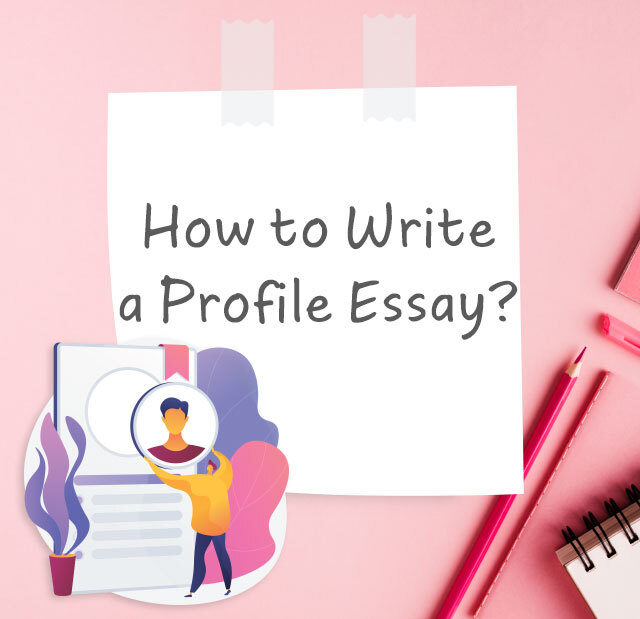
What Is a Profile Essay?
A profile essay can be considered a literary piece of writing, in which the writer mainly delivers a descriptive account of a person, place, or event. The goal of the profile essay is to be informative. It usually conforms to standards found in journalism – that is to say, using facts and offering impartial reportage – while conveying this information in a literary style.

Literary style means offering more to the reader than a revised press release or stenographed interview. Offer insight and immersion to the reader, show them the layers of character and environment, and run these underlying factual happenings through your individual interpretation of it all.
The Purpose of Profile Essays
The purpose of a profile essay is to be read and well-received by an audience. It is not an obscure technical writing piece, although it may cover obscure figures or events. In general, profile essays appear in magazines and newspapers – in either their print or digital formats. They also appear in scholarly or trade journals, usually covering rising or established people within these niches.
For the writer, a profile essay is a piece of writing aimed at joining the journalistic and literary style. As mentioned in the previous section, journalistic writing must be factual and rigorously checked for errors. Literary writing has some joy involved in its reading; in what way that joy comes out in ‘writing style’ is up to you.
Ultimately, with those two concepts in mind, the purpose of a profile essay is to get you, the writer, some more work. Profiles are highly prevalent and serve as a fantastic way of adding more pieces to your portfolio, whether you’re a new essay writer or a seasoned pro.
Prepare for your essay
Preparing for a profile depends on how close you are to starting writing. Writers coming to this article with a stretch of time ahead of them have the luxury of doing some background reading that is not directly related to the matter at hand. Finding a good profile essay example has the hidden benefit of looking like a lazy weekend afternoon; get a stack of magazines and read.
Some of the most common places to find quality profiles are The New Yorker, The New York Review of Books, the London Review of Books, Esquire, or National Geographic. Another perspective is to look for writers, head to your bookshelf or local book store, and do some digging. Again, read and make some notes on the qualities you enjoy and dislike in a range of profiles.
Lastly, in terms of reading, examine the differences between an essay or article profiling a person and one that profiles an event.
That form of preparation is more akin to education. It is needed to bolster your understanding of the broad picture and what is essentially the marketplace for your piece of work.
Preparing for your actual essay, not the skill of writing an ambiguous profile essay, is another matter. The research and reading that are highly relevant to your subject matter will make or break your profile essay.
To begin with, you must find all profiles of your subject that are in existence and don’t require a transatlantic flight to a dusty library archive – in this instance, simply email the library and ask if they’ve considered digitizing their collection, starting with your desired piece.
One of the most surefire organization tactics for research is timelining. Start at the beginning; be sure to go into ‘negative digits’ and look at the parent’s history or the town’s history, or anything else that emerges in your research.
After ‘time’ as a category of thinking comes ‘significance.’ What were the defining features of this person’s life, and to what sort of ‘movement’ might they belong? Add this into your timeline research and press on.
Have you selected a person or place that is feasible to contact and ask for a quote or interview? You may also want to reach out to other players in the story you’re telling and see what they have to say on things.
Preparing all this research can get messy and cluttered. The best way to solve this problem is to follow a system from the start, as mentioned above; time is a great organizer. Also, keep a running bibliography in a separate file on your computer. Keep tabs on everything you’ve read, and be as forensic as possible with maintaining records. Who knows what might happen in the future regarding the focus of your essay? They might run for president, or they might fade into obscurity.
Profile Essay Outline
As a profile essay combines qualities of journalism and literary writing, the ideal outline doesn’t exist. Literary writing can take the reader on a journey; in fact, the only requirement of the structure is to guide this journey as magnificently as possible.
Were we to suggest a general profile essay outline, it would contain these sections and ingredients. The order is flexible to an extent. It depends on the content of your profile. Have you got an interview to draw upon, or are you using your storytelling powers to deduct and infer from other sources?
In your introduction, if you’ve conducted an interview, use a quote for your lede. A good quote is an excellent way to set the tone and give an impression of your subject to the reader. Those without an interview might consider a bold statement; be sure that you use something here to act as a powerful lede and bring the reader on board.
Alluring mysteries are one thing; though the crunch point for this gambit is to make the pay-off worthwhile. Else, the cliff-edge and the tension you create will be for nothing in the end.
There will be time to provide things like background and biography in the main body of a profile essay. These tend to follow the lede as they’re a nice cool-down; they give the reader a chance to build knowledge on an obscure topic. Whereas for the writer, both the background and biography offer an opportunity to peg in some facts, figures, and breadcrumbs to draw upon later.
The body of a profile essay is tricky. You, first of all, need to engagingly tell your readers the story in it. Remember to build tension and really ‘let go’ when it comes to releasing that tension. Tell it to a friend, read it aloud. Move around the paragraphs. Remember that the profile is following an arc and in your conclusions, hook back in the initial qualities of the opening part. This technique is like cadence in music, and it will please your audience as long as it isn’t too trite.
Profile Essay Topics
A suitable subject or topic depends on your qualities as a writer and the desired outcome of writing such a profile essay. Now, it does not have to include an interview, but many profile essays do include them. Some profile essay topics may be inanimate objects or complex emergences of human life (events). If this is the case, you can still interview
For interviews, considering you’re likely a lowly reporter on a college paper, getting an interview with a high-flying sportsperson, politician, or musician is unlikely. In any event, the lower-flying specimens of these species could make a good target.
The most important thing to consider when choosing the topic or subject is to work with your gut and instinct. If you’re interested in the story, you’re going to have much more to put into it, and your excitement and verve will show through in writing. It may also make it easier to stomach the long hours of tedious research that can emerge when trying to prove or disprove an obscurity of some kind.
If you haven’t decided on the topic, there’s still room for maneuver. You can look at the subject matter and present your perspective on the case; that’s the subjective element of a profile, your view.
This perspective of yours can focus on just one specific aspect of a person or event. By removing the duller or more well-trodden elements of a character, you open up the chance to explore a new side of a topic. It’s also a fantastic skill for writers to be able to recap well-known things or facts quickly. Writing in this style for a very general audience should be a skill in any writer’s arsenal.
Profile Essay Examples
Properly digesting the advice and points made in this article can be aided by reading some profile essay examples. Look for examples given out in your class, or search around using the main keyword – profile essay examples.
Here are a few examples for you to get a catch on how to write profile essays excellently:
https://www.newyorker.com/magazine/profiles
https://longreads.com/2019/12/17/longreads-best-of-2019-profiles/
https://longreads.com/2017/12/18/longreads-best-of-2017-profile-writing/
Writing Tips for a Profile Essay
How to write a profile essay in three steps; pick a subject, do your research, and start writing. Remember that a profile essay is a literary and a journalistic piece of writing. It’s non-fiction, so your facts and figures must be accurate, and any discrepancies or controversies surrounding your data can form a part of your analysis.
Always write with your reader at the forefront of your mind. Visualize your reader, even if it’s a college essay, and think of how you could pitch your piece to a publication. The natural home of a profile is in the media, not in the college textbook. So write the essay with publication in mind.
Here are some essential tips for a profile essay composition:
- Conduct thorough research on your topic, look for potential interviews or aspects not covered in previous profiles if they exist. Also, make sure you’ve read all of the profiles on or related to your subject matter; a profile is an evolving topic, and new facts can emerge.
- Profile examples are available online, as well as those posted by educational institutes, and of course, those featured in the media. Reading these serves as excellent preparation and inspiration.
- The structure and overall outline of a profile essay is something with a degree of flexibility. While the introduction and rounding off of the essay will look familiar, tracking a person’s profile or event can involve highly unique pieces of information. Unlike many other papers, profiles don’t have to strictly conform to the thesis, antithesis, and synthesis structure. However, this familiar form of writing still works in part when writing a profile.
Write a Profile Essay with HandmadeWriting
HandmadeWriting can help with the development, construction, and polishing of a profile essay. As an organization, we draw on academics and writers’ expertise from across the spectrum of the written word.
Getting started can be difficult, but consulting with HandmadeWriting offers a way to get the ball rolling. The writers at HandmadeWriting are used to working on a countless number of topics and essay styles. The staff is also familiar with working under a tight deadline, not to mention those tasks where the endpoint is less defined.
HandmadeWriting makes composing an essay or profile piece simple. Talk with a skilled writer and editor today on your topic, and you can make a start immediately.

A life lesson in Romeo and Juliet taught by death
Due to human nature, we draw conclusions only when life gives us a lesson since the experience of others is not so effective and powerful. Therefore, when analyzing and sorting out common problems we face, we may trace a parallel with well-known book characters or real historical figures. Moreover, we often compare our situations with […]

Ethical Research Paper Topics
Writing a research paper on ethics is not an easy task, especially if you do not possess excellent writing skills and do not like to contemplate controversial questions. But an ethics course is obligatory in all higher education institutions, and students have to look for a way out and be creative. When you find an […]

Art Research Paper Topics
Students obtaining degrees in fine art and art & design programs most commonly need to write a paper on art topics. However, this subject is becoming more popular in educational institutions for expanding students’ horizons. Thus, both groups of receivers of education: those who are into arts and those who only get acquainted with art […]
How to Write a Personal Essay: Your Easy Guide

The power of a well-written personal essay should never be underestimated. Inspiring readers with your experiences, lessons learned from past mistakes, or simply describing the joy you felt from doing a fun activity can literally change people's lives. Take a moment to reflect upon this. How much influence you can have on your audience with just a pen and paper in your hand and thoughts flowing through your head is insane.
To take the reins of your floating thoughts and put them into perspective, you need to know how to write a personal essay. Otherwise defined as a nonfiction narrative story, the personal essay format differs slightly from other kinds of writing with its implicit structure. Once we touch upon those, we will also explore some personal essay topics with our online essay writing service . After reading this article, we promise you'll be so confident writing your personal statement that you might want to craft many personal essays in one go!
Proper Format
When trying to understand what is a personal essay, you must start with the formatting specifics. And no, we didn't mean to scare you off if this sounded too complicated! The format for personal essay can be similar to most academic tasks with just a few distinct aspects. Let's examine the details from our paper writer :

- Font : Unless required to write in a Harvard essay format , you can use any readable fonts - Times New Roman, Arial, or Calibri in size 12.
- Margins : Just like in most writings, set your margins to one inch on all sides.
- Spacing : This is a classic! Use double-spacing throughout the essay, including between paragraphs.
- Indentation : Indent the first line of each paragraph by 0.5 inches or use the tab key. This might be a little too specific, but it's a true-and-tried method!
- Page numbers : Include page numbers in the top right corner of each page. You don't have to do this necessarily, but it can add more spark to your paper!
- Title : Include a title that reflects the theme or subject of your essay. Center the title on the page. Did we really have to elaborate on this?
- Header : Include a header with your last name and the page number in the top right corner of each page. After all, it's your personal story; why would you want to miss your name here?
- Length : The length of a personal essay can vary but typically ranges from 500 to 2,000 words. Well, unless you're discussing healing from a generational trauma... Then you'd probably need a few more extra pages.
- Tone : The tone of a personal essay should be conversational, reflective, and sincere. At least, this is what we recommend not to sound dull.
- Personal pronouns : Use first-person pronouns such as 'I,' 'me,' and 'my.' Remember, the spotlight is directed at you as you're the true hero of the story.
Personal Essay Topics
If you have got a lot of exciting stories to tell, your personal essay can shine brightly by interactively engaging the reader. Put in a little extra effort and dig deeper to find a unique or interesting experience or an unusual moment in your life.
Looking at a life lesson from another angle can turn into deep and purposeful subject matter. If you decide to pick a topic from a huge list of personal essay topics that you found in the internet, be precise and careful because not all of them can meet the requirements of your professor.
Personal Narrative Essay Topics
In this type of writing, try to explore a unique experience that creates a sense of conflict in your life. Explore how and why you were confused, annoyed, or hurt by the experience. Imagine your piece of paper as a place where you can freely express your emotions, discuss significant moments, & reflect on their impact on your life. This tip can help you create many really good essay topics, but if you need motivation, you can find some examples below.
- 'One small step that helped me skyrocket in my career!'
- 'Why controlling urges teaches you to master self-control.'
- 'People only learn from their own mistakes.'
- 'Life is not a one-dimensional path: it is curvier than a snake!'
- 'What I learned about conquering my fears.'
- 'The moment when I should have made a better choice.'
- 'The moment I overcame my public speaking fear.'
- 'How I conquered adversity with strength.'
- 'The impact of mentorship: valuable lessons learned from my mentor.'
- 'My journey to finding a place to belong.'
Personal Essay Topics on Specific Emotions
You may also talk about a specific event in your life that left a long-lasting impression on you. Usually, this type of essay reflects an incident that took place in your life and shifted it in some way. Dive deeper into your mind and find an event that is unique and personal to you. The weirder the occurrence, the more likely the essay will be engaging to read.
- 'How I ran away from fear: the power of exercising.'
- 'How I overcame the trauma through painting.'
- 'My quest to reclaim my cultural identity
- 'How I tackled cultural shock while studying abroad.'
- 'The year I went from being an amateur to a professional artist.'
- 'The best solo hike of my life
- 'The moment I beat my eating disorder and learned to love my true self.'
- 'How practicing gratitude helped me find beauty in the ordinary.'
- 'The power of letting go of toxic relationships
- 'How I lived up to my family's legacy.'
If you have not noticed, each of these titles can bring a fascinating vibe to the table. The names grab your attention, but you can only honestly know what they are about when reading them. That is the secret to a provocative title!
And if you'd rather have a pro write your personal essay for college, purchase essay on our platform and lay back in peace knowing your task is in expert hands!
Want to Get Ahead of the Curve with Your College Essays?
Then let our skilled writers create a custom essay that meets all of your requirements and helps you achieve your academic goals.
Crafting an Outline for Personal Essay
Like most academic tasks, the personal essay can be easily structured into 5 paragraphs . This is one of the most important steps of personal narrative essay writing at any level. Your outline for personal essay will serve as a navigator, so you don't want to get off track. Understanding how to start a personal essay, what to write in body paragraphs, and how to conclude it appropriately will be important.
How to Start a Personal Essay?
Start your writing with an introductory paragraph. As it gives your reader a clear understanding of what the story will be about. Employ a hook sentence to catch their attention and motivate them to read the rest of the paper with a whimsical thesis statement. It can be a narrative thesis, for example. But it must be written in one concise sentence that will bring the reader to the starting point of your essay.
Don't leave your readers in the dark in the introduction by explaining the important things such as:
- Who are the major characters?
- When and where is it taking place?
- What kind of story is it?
Creating the Personal Essay Body
After creating an introduction, you must formulate three body paragraphs supporting your thesis statement. Each new point should contain its own body paragraph. Don't forget to make transitions from one paragraph to another to make sure that everything flows smoothly.
Usually, the body section is presented in the form of your experiences and your reflections on these events. You should also note the passage of time in your body sections, so make sure that the reader is aware of when and how each specific chapter took place.
How to Write a Conclusion Paragraph for Personal Essay?
Ultimately, it will be essential to wrap everything up and give your audience a sense of completeness by writing a proper conclusion. Restate your thesis, summarize the main points you have stated in body paragraphs, and leave your reader with a specific emotion, depending on the subject of your paper.
Readers should also discover a life lesson by going through the story. It is a moment where you show what you have learned from your experiences or how previous events have changed your life.
Tips for Personal Essay Writing Process
If you think you already possess sufficient knowledge of personal essays, we've yet to supply you with more information. Now let's explore the various stages of personal essay writing. Follow the list of valuable tips and advice without skipping a beat from our service where you can buy personal statement too.

Start with an Engaging Opening Sentence
Open your personal essay with an introductory section that will be engaging and interesting for your reader. In the opening section, introduce the principal characters of the story as well as the central theme or themes. It should also present the fundamental question of the essay.
Write from Your Unique Point of View
You are free to write from your point of view or in your own unique style. In contrast to other types of essays, writing from your perspective or in your personal manner is welcomed. For instance, if you are writing about a trip adventure, you might express your individual writing style by describing the sights and sounds that captured your attention. As a result, your writing will be more interesting and genuine and will better convey your experiences and feelings.
Take the Characters into Account
Be sure to describe your characters from all angles. Even though it is your real-life experience, you should still consider storytelling elements like the plot and characters. Using these ingredients in your writing will keep your reader engaged and help your essay flow smoothly.
Shed Light on a Deep Truth
Discuss your background experience with honesty and curiosity. Don't be afraid to uncover a hidden truth or a truth you didn't know was there at the time. Expose a thing that is uncomfortable or difficult for you to discuss. No matter who will read your essay. Whether it will be a teacher or somebody else, they will definitely appreciate your honesty and strive to share your experience.
Write a Rough Draft & Submit
After you have completed all the previous steps, it's time to write a rough draft. Writing a rough draft lets you get new ideas for a personal essay. Moreover, it's a great place to polish your essay and correct small grammar, spelling, and other types of mistakes. Get a second pair of eyes: No one can rate your writing as well as a neutral party. Once you have checked everything, you can start writing the final paper.
Before submitting your personal essay, double-check everything once again and make sure to present the central theme. After it, go through it and proofread your entire piece. Reading an essay full of grammatical mistakes is somewhat frustrating, which can be easily avoided. You can ask your classmate for help, so in that way, you will save each other. Don't forget to meet the deadline - and you're officially finished!
Personal Essay Examples
In our time it’s much more easier to find things on the Internet, and examples are not an exception. Remember one simple thing: not everything that you can find on the Internet is done correctly. If you need some inspiration to get started, you can find several examples of personal essays below, or you can use our free essay samples to sharpen your skills on any type of writing.
As we scratched the surface of the personal essay writing process and delved deep into the specific stages of creating a flawless paper, we hope you gained some valuable insights. These tips are all you'll ever need to inspire readers or even WOW the admissions officers!
If you want our experienced writers to help you with any writing assignment, whether a persuasive essay , creative nonfiction, or any type of college essay, hit us up with your ' do my homework for me ' request and consider it done with the highest caliber!
Want a Powerful Reflection of Your Personal Story?
Order your custom personal essay now and let our expert writers bring your unique experiences to life
Related Articles
.webp)
- PRO Courses Guides New Tech Help Pro Expert Videos About wikiHow Pro Upgrade Sign In
- EDIT Edit this Article
- EXPLORE Tech Help Pro About Us Random Article Quizzes Request a New Article Community Dashboard This Or That Game Popular Categories Arts and Entertainment Artwork Books Movies Computers and Electronics Computers Phone Skills Technology Hacks Health Men's Health Mental Health Women's Health Relationships Dating Love Relationship Issues Hobbies and Crafts Crafts Drawing Games Education & Communication Communication Skills Personal Development Studying Personal Care and Style Fashion Hair Care Personal Hygiene Youth Personal Care School Stuff Dating All Categories Arts and Entertainment Finance and Business Home and Garden Relationship Quizzes Cars & Other Vehicles Food and Entertaining Personal Care and Style Sports and Fitness Computers and Electronics Health Pets and Animals Travel Education & Communication Hobbies and Crafts Philosophy and Religion Work World Family Life Holidays and Traditions Relationships Youth
- Browse Articles
- Learn Something New
- Quizzes Hot
- This Or That Game New
- Train Your Brain
- Explore More
- Support wikiHow
- About wikiHow
- Log in / Sign up
- Education and Communications
- Autobiographies
- Personal Profiles
How to Write a Winning Professional Statement: A Complete Guide
Last Updated: March 6, 2023 Fact Checked
What is a personal profile?
Formatting & style, writing a personal profile: the winning formula, insider advice for crafting a personal profile, career-specific personal profile examples, personal profile outline, expert q&a.
This article was co-authored by A.J. Aldana and by wikiHow staff writer, Caroline Heiderscheit . A.J. Aldana is a social media specialist who has been using platforms such as Tik Tok, Instagram, and YouTube for over 5 years. A.J. has worked with brands to curate content that has garnered thousands of interactions for various social media campaigns and is passionate about contributing to innovative and trending articles on wikiHow. He holds a BS in Product Design from Stanford University. This article has been fact-checked, ensuring the accuracy of any cited facts and confirming the authority of its sources. This article has been viewed 696,355 times.
You’re writing your resume so you can go snag a new job, but what is this “personal profile” you keep seeing everywhere? A personal profile (or, personal statement) is a brief highlight reel to sell yourself to potential employers, and luckily, it’s easy to master the key points to hit. We’ll walk you through the basic formula of a compelling personal statement; plus, we’re offering pro tips and example statements for tons of specific careers, too. Basically, all of your burning questions will be answered below. Ready to win your dream job ? Read on.
Things You Should Know
- Included your personal profile at the top of your resume under a professional header (like “Career Profile”) and in an appropriate font.
- Make sure to include your current role (or degree), a few key skills, some concrete achievements, and a summary of your future career goals in your profile.
- Tailor your professional profile to the job you're applying for. Be sure to include accomplishments and talents relevant to the role.

- Choose between professional, descriptive header options, like "Summary of Qualifications," "Career Profile," and "Career Highlights," so readers know that you're covering your professional profile.
- Font type is important, too. Match your font to the rest of your resume, and choose something professional (like Times New Roman).

- Pro tip: use strong, descriptive language when describing yourself. Words like “nice” and “smart” won’t be as effective as “loyal,” “proactive,” or “ambitious.”
- “Literature enthusiast and recent graduate of University of Chicago…”
- “Energetic, innovative marketing specialist with 12 years of experience…”
- “Most recently, a skilled Camera Operator and dedicated teammate…”

- Pro tip: Keep your personal profile short and sweet. Your entire blurb will be just a few lines (max 6), so keep your personal description to just a few words. [4] X Research source
- “...skilled at working under pressure and hitting competitive deadlines.”
- “...comfortable dealing with complex, interpersonal issues while managing 30+ students at once.”
- “...knows how to create polished, unique work that consistently impresses clients from all industries."

- Pro tip: Tailor your profile to the job’s ad. Look for responsibilities and qualifications on the page, then nod to them here. If they’re looking for “energetic” professionals, explain that you’re excited to get work. [6] X Research source
- "Looking for an opportunity to develop my skills in Human Resources while supporting a hard-working, passionate team of professionals.”
- “Seeking an online publication where I can jump into the editorial deep-end—I’m excited to contribute engaging pieces and work alongside talented writers.”
- “Eager to apply my organizational and problem-solving skills in a role as an Executive Assistant, all while learning from a successful titan in business.”

- Pro tip: Tie your accomplishments to numbers if you can. A sales goal, a number of issues published, or even a number of guests served—these can help your statement shine.
- “Experience writing code in C, C++, JAVA, JAVASCRIPT, PHP, RUBY, Objective C, and Python.”
- “In 3 years as a Customer Service Representative, I’ve won the Top Support Staff Award 5 times and received a 95% helpfulness rating from customers.”
- “I’ve managed a kitchen staff of 30+ service professionals and directed luxury dining for 300+ guests at once.”

- I’m a [2-3 relevant adjectives to describe you] [your career or student title] who is skilled in [your talents and abilities]. I’m looking forward to [your career objective] after achieving [your concrete accomplishments].
- [2-5 bullets with concrete achievements]

- Use strong, descriptive language when describing yourself. Basic words like “nice” and “smart” won’t be as effective as “loyal,” “proactive,” or “ambitious.”
- Keep your personal profile short and sweet. Your entire blurb will be just a few lines (max 6), so be choosy about your language. Make sure every word is working hard!
- Tailor your profile to the job’s ad. Look for responsibilities and qualifications on the page, then nod to them here. If they’re looking for “energetic” professionals, explain that you’re excited to get work. [9] X Research source
- Tie your accomplishments to numbers. A sales goal, a number of issues published, or even a number of guests served—when noting your concrete achievements, numbers can help your statement shine.

- Boosted sales by 15% over 6 months
- 89% conversion rate from the top of the funnel
- Reeled in 50k of new business in 3 quarters

- Cut business costs by 5% over 2 years
- Managed annual budget of 300k
- Delivered a 1.8% ROI on projects managed this year

- Tested networks and sandboxes with 100% accuracy
- Mastered JavaScript, Python, R, HTML, CSS, and C++
- Managed SQL Server 2008, MS Access, and MySQL
- Competent with Eclipse, NetBeans, Emacs, and Rational Rose

- Increased open rate for online campaigns by 30%
- Managed campaigns with annual budgets over 500k
- Boosted YOY unique visitors by 300%

- Certified in CBEST and CSET (Mathematics)
- Increased grade average of standardized tests by 13%

- Skilled in Photoshop, Illustrator, and InDesign
- Designed graphics for new campaign, reaching 40k viewers
- Created designs for social campaigns, winning 2k points of engagement

You Might Also Like

- ↑ https://www.careereducation.columbia.edu/resources/how-write-resume-profile-or-summary-statement
- ↑ https://www.idealist.org/en/careers/an-easy-formula-to-help-you-craft-the-perfect-resume-summary
- ↑ https://www.opencolleges.edu.au/careers/resumes/personal-statement-for-resume
- ↑ https://www.literacymn.org/sites/default/files/sample-professional-summary-statements.pdf
About This Article

To write a personal profile outline for an application, use "I" instead of "he" or "she" to create a strong and direct voice. Additionally, include one key experience, achievement, or contribution to highlight. You should also be clear about your career aim or goal, and what you hope to gain from the position you’re applying for. Once you draft your profile, read it out loud for flow and tone, check that it’s under 200 words, and attach it to the top of your resume. To learn how to avoid buzzwords in your personal profile, keep reading! Did this summary help you? Yes No
- Send fan mail to authors
Reader Success Stories
Sep 4, 2016
Is this article up to date?
Featured Articles

Trending Articles

Watch Articles

- Terms of Use
- Privacy Policy
- Do Not Sell or Share My Info
- Not Selling Info
wikiHow Tech Help Pro:
Level up your tech skills and stay ahead of the curve

How to write a Good Profile Essay from Start to the End
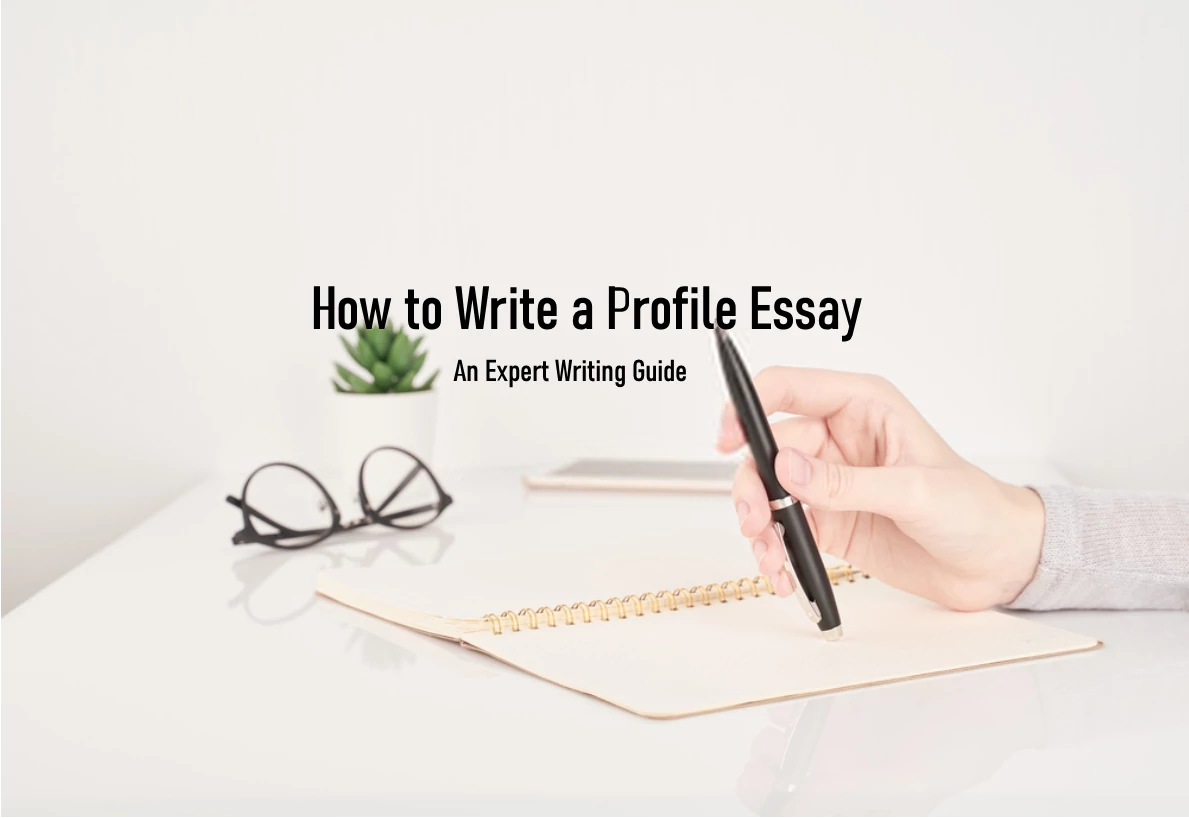
Before even learning how to write a profile essay, you need mastery skills on how to begin it. Undeniably, unfinished work does not guarantee any audience or grades. However, it begins by knowing how to write a profile essay and what a profile essay is.
In your journey as a student, your professor or instructor will test your profile essay writing skills. Therefore, you need to know how to write the body paragraphs of a profile essay, how to conclude your profile essay, and how to write an outline for a profile essay. This article guides you on how to do that.
If you have interviewed someone or read their autobiography, you understand what a profile essay is. However, there are times when writing even the simplest of all essays becomes tough.
Begin the essay with the person's appearance if you describe a notable individual. For instance, detailing some of the Degrees and the universities a person attended can be a good starting point for creating an excellent profile essay. If it is an essay about a city, focus on the demographics, world rankings, awards, geography, name, and other notable features.
What Is a Profile Essay? Defining a Profile Essay
A profile essay is a form of descriptive literary writing that centers on describing a place, an event, or an individual/person. As such, the essay should always be well-composed, comprehensive, and have balanced information on a given subject.
For instance, if asked to describe a notable past Feminist, civil rights activist, philanthropist, organization, or medieval city, it boils down to writing a profile essay. Therefore, it is not just some superficial description of the subject. Preferably, it is designed to respond to questions when trying to understand the subject.
An example of a profile essay is an interview written by an interviewee. Mostly, profile essays are written by a major journalism student as part of their term paper, coursework, or assignment.
A comprehensive profile essay fetches great grades and should demonstrate in-depth research, knowledge, and organizational skills. It is wise to use spatial order when writing profile essays on places or things.
The Purpose of Profile Essays
Profile essays describe a place, thing, event, occurrence, or person. For that reason, its purpose is to:
- Detail some of the observations and knowledge on the subject.
- To give the audience an understanding of the person, place, or thing under discussion.
- Prove your prowess in writing great profile essays.
Profile essays assess your organization, presentation, and research skills in college. It is one of the most confusing types of essays. It would be best to have tips and skills to write an outstanding profile essay. Even with the millions of examples of profile essays or essays on someone, you can wonder how to write a profile essay.
An example profile essay on a person is a profile essay on Warren Buffet, Mark Zuckerberg, Mitt Romney, Barack Obama, Donald Trump, or George Bush. It is the same thing if you are writing an essay about yourself. You have at some point, wondered how to write a profile essay of yourself, haven't you?
Remember, any essay writing process is preceded by preparing an outline or structure of the essay. This is not different for profile essays.
Above all, ensure you have enough information on the subject of interest before putting down your points.
Structure of a Good Profile Essay-Sample Outline of an Essay about a Person
Let us look at how to structure a profile essay. Maybe this would help when writing a professional or personal profile essay. Here is a breakdown of a profile essay:
- An opening paragraph/ introduction . This should give a brief description of the subject and the scope of the essay, and present the thesis statement. The introduction should begin with a leading sentence that describes the event or the person. The following sentences can then summarize informative points in the body paragraphs.
- Main Body. The body paragraphs determine the length of the essay. A short profile essay should have at least three body paragraphs. The body paragraphs should include examples. If you use external sources, ensure you cite them. It is only through that that you can avoid plagiarism in your college and university essays.
- Conclusion/ closing paragraph . This is the climax of your profile essay and should restate the thesis , summarize each body paragraph, and bring closure to the essay.
Rules are rules; these are just some things to strictly follow as they guide how to write a profile essay.
Related Reading: How to write a perfect informative essay.
How do you start a profile Essay?
It has been a long time coming, but let us face it. Typically, a profile essay must be comprehensive, attractive, and presentable. In this regard, you must set very high standards for first impressions for a lasting readership.
So then, what do you write in the introduction of a profile essay? The introductory/opening sentence must be an attention grabber or an essay hook that engages the reader. Besides, your subject matter must reflect in the essay's thesis statement.
Profile essays must include a well-thought and crafted thesis in the opening paragraph. Tell the audience why they need to stay tuned in reading the essay.
Anecdotes, quotes, or adages could be an excellent beginning of the introductory sentence. To an allowed extreme, you can include humor to engage and intrigue the readers.
Every person is unique in their own accord. Therefore, you must show total respect to individuals when writing an essay about that someone. For this reason, it is preferred that you take a condescending tone. No one will tell you this, but such a tone produces the best essay on a person. Disrespect makes a profile essay lose taste. Do we need to tell you the consequences?
Concluding a Profile Essay
Students and professionals alike always wonder how to conclude a profile essay. Well, not our professional essay writers. You have been successful in writing the entire essay. Now, in conclusion, you have to convince the readers. Writing a good conclusion is mandatory for an essay.
Always restate the thesis statement. Restating does not mean introducing new concepts. However, it means using different words but maintaining message-paraphrasing. When writing an effective conclusion, you should answer what next? Or, so what? Focus only on stuff relevant to the readers.
It would help to summarize each body paragraph in the chronology or order of the essay. Ultimately, your conclusion should leave the readers yearning for more on the chosen profile essay topic.
Remember, each of the paragraphs must have an opening sentence, the facts and examples, and a concluding or closing sentence. Stick to coherence as it ensures a good flow in your paper. Besides, always use transitions to bring flow to your profile essay.
Here is a sample profile essay on a famous person. The person of interest is Tim Cook, the CEO of Apple company.
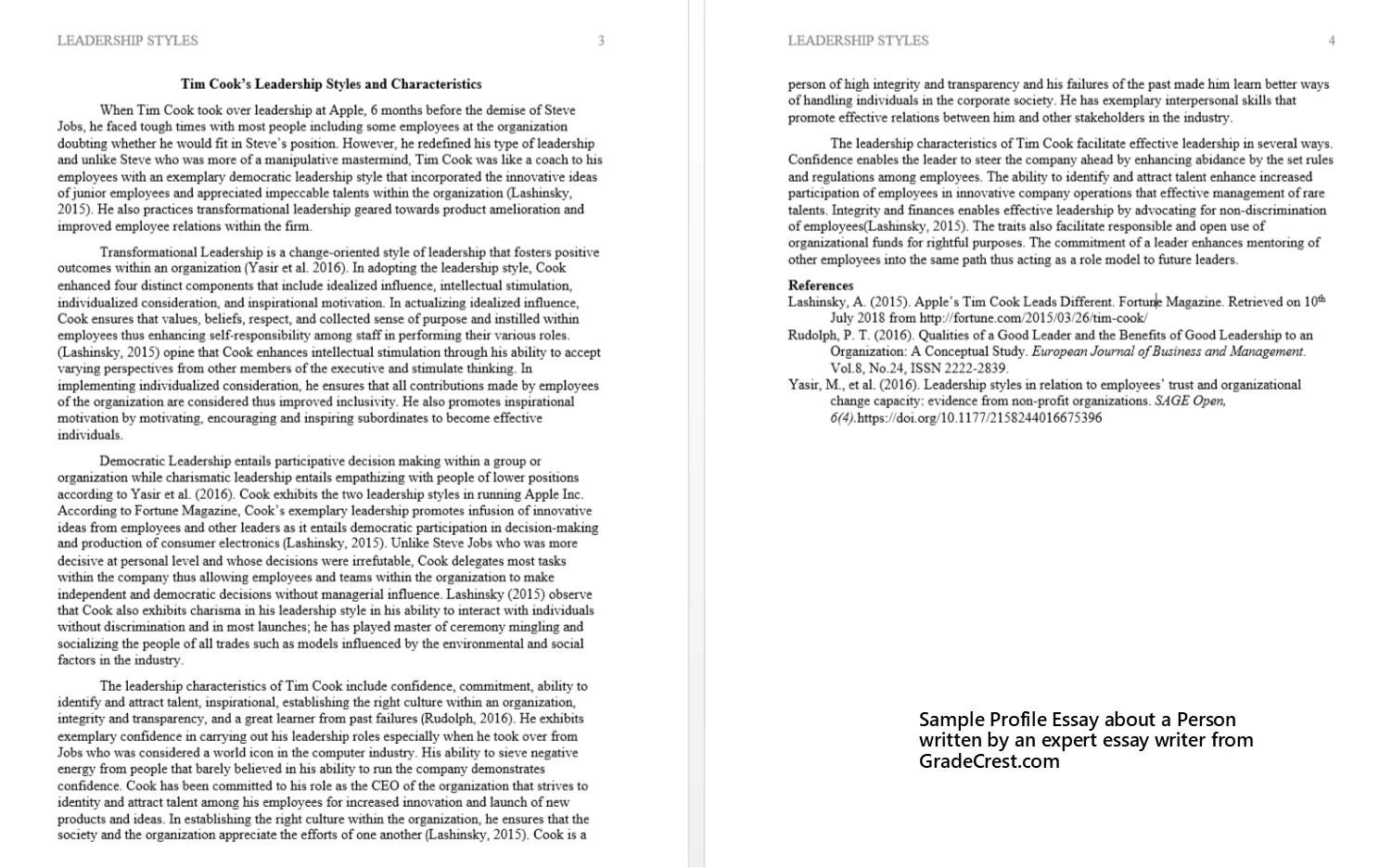
Writing an Essay Title Correctly
Undeniably, high-quality and scoring essays have short and eye-catching titles. When choosing a title for your profile essay, consider these facts:
- Focus on the features of the person, event, or thing under discussion or the subject.
- It should reflect your main idea in the essay
- A good title should grab the attention of the readers
- From the onset, it should give highlight what to expect in the entire essay
- Never choose a topic that is too broad or one that is too narrow
- Use simple words, as there is power in simplicity
The title of your profile essay should be descriptive. Mainly, it should have the name of the subject incorporated. Besides, it should reflect the central idea of the essay. If you are writing an essay about someone, the title should be one striking thing that forms the theme of the entire essay. For example, Bill Clinton: The Best President America Never Had can be a catchy title for a comprehensive profile essay.
You asked how to write a profile essay; we have given you more than that. The best is even yet to come.
Sample Profile Essay Prompt
Your assignment is to use the writing process to compose a 3-5 page profile essay about an intriguing person place or celebrity in your community (Omaha, NE). DO NOT WRITE ABOUT WARREN BUFFET, famous celebrities, politicians, athletes, religious figures, historical figures, vacations, etc.
Facts to Remember: An Essay Writers Guide to Writing a Profile Essay
- Always show some respect on the subject . Sometimes your professor can assign a profile essay topic to someone you hate. It would be best if you showed some respect. Typically, this should reflect in your choice of words. Do not let emotions drive you. Get information from the research, and do not dwell on Fake News.
- Avoid any grammatical errors . Use the third eye to remove grammatical or syntax errors from your essay. This is where our essay editing and proofreading service comes in handy.
- Use simple language . There is unprecedented power in using simple language in academic essay writing. At all costs, avoid the jargon as they spike a well-written essay.
- Apply the use of appropriate terms . This refers to the right choice of descriptive words and transitions.
- The paragraphs should be well-balanced . Ensure the paragraphs do not exceed 150 words when writing a profile essay. Also, all the paragraphs should be well-balanced in terms of length.
- Stick to the outline of your profile essay . Anything out of the structure is useless.
- Like any other homework, you should use a professional tone . Only interviews are examples of profile essays about a person requiring the first.
Related Reading:
- How to title an article in an essay.
- How to write a narrative essay fast
Get Help with Writing Professional Profile Essays
Do not confuse profile essays with a LinkedIn or social media profile. A dating site profile is different from a profile essay. Now that you know how to write a profile essay, time constraints can come your way and academic success.
In this case, you can pay for essays and get profile essay writing services anytime if you want to write a profile on a person and don't know how to, kindly seek help. Gradecrest is an urgent essay writing service known for its diligent essay writing services.
Our writers understand what a good profile essay looks like. You can buy our essays online or look up our offering on descriptive essays .
Our committed team of writers works 24/7 to ensure that even urgent essays are delivered. So, if you want someone to type your profile essay with , choose us!

Gradecrest is a professional writing service that provides original model papers. We offer personalized services along with research materials for assistance purposes only. All the materials from our website should be used with proper references. See our Terms of Use Page for proper details.

A personal profile

Learn how to write a personal profile for a social app or website.
Do the preparation task first. Then read the text and tips and do the exercises.
Preparation
MultipleSelection_MjI1OTQ=
By day I'm a regular guy and by night a superhero … How tiring is that?!
Just joking! I'm a regular guy all the time, good job, close to my family, just bought my own flat with a cat. Actually, my cat thinks I'm a hero because I saved her from the street. I'm a talkative person and I believe communication is the most important thing in a relationship.
Likes and dislikes
I love pizza if it's Italian, wine if it's white, and football if it's the World Cup. I read a lot, especially true life stories, but most of my books live on my phone.

1. Write about your good points, not your bad points.
2. Don’t include every single thing. Choose a few points and focus on them.
3. Don’t add your contact details (e.g. address, phone number). You could get unwanted messages.
4. Check your spelling and punctuation before you post.
Are dating apps a good way to meet people?
Language level
Online courses.

Group and one-to-one classes with expert teachers.

Learn English in your own time, at your own pace.

One-to-one sessions focused on a personal plan.

Get the score you need with private and group classes.
We use cookies to give you the best experience possible. By continuing we’ll assume you’re on board with our cookie policy

- A Research Guide
- Writing Guide
- Essay Writing
How to Write a Profile Essay
- Purpose of profile essay
- How to start
- Structure and outline
Step-by-step writing guide
- Profile essay format
Helpful profile essay examples
What is the purpose of a profile essay, how to start a profile essay correctly, checking successful profile essays matters, choosing your profile essay subject, determine the style and tone of your writing, profile essay structure and outline, profile essay mandatory sections.
- An Introduction. Under ideal conditions, it should contain several sentences and provide background information about the subject.
- Body Sections. This part should discuss all the points mentioned in the introduction paragraph yet in greater detail.
- Conclusion. It is where you provide a summary of all the key points.
1. Determining your profile

2. Choosing your profile essay subject
3. writing an introduction, 4. working on body paragraphs, 5. conclusion part, 6. final editing and proofreading, profile essay formatting tips.
- Keep information accessible and clear to your readers.
- Your sentences should not be overly long. Write to the point.
- The structure of paragraphs must implement topic sentences as you write.
- Choose your words and phrases wisely to convey the main meaning.
- Offer details and examples along with key facts or an interview.
- Offer a summary sentence in each paragraph to make smooth transitions.
- Write in a focused and enjoyable manner by avoiding overexplaining things.
- Use creative narration methods to keep things more inspiring.
- When you are confused, approaching a cheap essay writing service with experienced writers may help you narrow things down.
- Keep your writing balanced and offer explanations and glossary points for all the elements that may require an additional explanation.
- 10+ Profile essay examples . These contain free expository and interview examples available free of charge.
- Profile essay composition examples by Washtenaw Community College.
- Purdue OWL Writing Lab formatting and writing style guides help.

Receive paper in 3 Hours!
- Choose the number of pages.
- Select your deadline.
- Complete your order.
Number of Pages
550 words (double spaced)
Deadline: 10 days left
By clicking "Log In", you agree to our terms of service and privacy policy . We'll occasionally send you account related and promo emails.
Sign Up for your FREE account

Forget about ChatGPT and get quality content right away.

How to Write a Profile Essay With Tips and Examples
22 December 2023
last updated
Students may encounter profile essays in nearly all disciplines, which makes it essential for them to understand profile essay writing. Basically, this guide commences with a definition of a profile essay and highlights its traits. Then, the manual discusses the significance of interview or observation sessions in profile essay writing and elaborates on the differences between a profile essay and other forms of academic papers. Lastly, the guide deconstructs the structure of a profile essay and provides clear directives on the writing of each part. In turn, the manual contains a sample outline and profile essay, which exemplify the content of this guide. Hence, students need to learn how to write a profile essay to develop their academic skills and understanding of a concept.
General Guidelines for Writing a Profile Essay

For writing your paper, these links will be helpful:
- Buy College Essay
- How to Write an Informative Essay
- How to Write an Analytical Essay
- How to Write a Definition Essay
- How to Write an Evaluation Essay
1. Definition of a Profile Essay
A profile essay is a type of academic paper that presents a detailed description of a person, event, or place by using a well-organized structure. Basically, authors spend a significant amount of time researching a particular topic to collect the less obvious information that a reader cannot acquire through a simple web search. In this case, a profile essay contains vivid descriptions and clear explanations that students derive from various reliable sources . Therefore, a profile essay is an expository essay , which implies that authors write papers with the sole purpose of informing the audience regarding a given topic by using facts, examples, and other relevant evidence.
2. Distinct Traits of a Profile Essay
During the composition of a profile essay, students do not need to write a position or present an argument concerning a topic of interest. Basically, the authorship style that learners use in writing a profile essay should not lead the audience toward any predefined conclusion regarding a topic. Instead, authors present readers with facts or evidence and provide them with adequate ‘space’ to reach individual conclusions. Accordingly, a thesis statement of a profile essay does not announce a central claim . In turn, profile essays have a high demand for objectivity because any attempt to persuade the audience to support a perspective undermines the purpose of a paper.
3. Intrinsic Value of Interviews and Observations
Interviews and direct observations are critical to the formation of a profile essay. Mostly, interviews or observations are the main sources of information for a profile essay. In particular, students should plan to interview or observe the object, place, or event because it is the only way to write unique content for a profile essay. Also, learners must be prepared adequately for an interview or observation session to ensure that they can acquire the necessary information to complete their papers. During interviews or observation sessions, documentation is essential because it provides authors with an accurate record of the information. Specifically, the record is useful when writers need to verify some facts that they choose to include in a profile essay. In turn, video recordings, tape recordings, and notetaking are the preferred means of capturing information from interviews and observation sessions.
4. How Does a Profile Essay Differ From Other Papers
Profile essays are different from other types of essays because they have a low reliance on secondary sources . Basically, the use of secondary sources is widespread in academic writing because it is easy to locate and access such sources and establish their reliability from bibliographical information. However, authors of secondary sources may skew the meaning of information to achieve a specific purpose or exclude critical details that have no relevance to the source’s central claim. In consequence, secondary sources are rarely comprehensive sources, and writers of profile essays use them to verify facts rather than collect evidence. Moreover, primary sources are suitable for writing a profile essay, but the acquisition of credible sources is quite challenging, which causes students to conduct interviews or observe a place or event.
Structure of a Profile Essay
1. the role of an introduction.
The introduction is the first distinct section of a typical essay structure . Mostly, the introduction has only one paragraph. In this case, the primary role of the introduction is to set the context of a profile essay and provide the audience with a reason to continue reading the remaining sections of a paper. Moreover, the introduction becomes longer with the increase in the profile essay’s word count. Nonetheless, the introduction’s word count should not exceed 10% of the essay’s word count. In turn, the introductory paragraph should not contain any in-text citations except for a situation where students use a direct quotation to begin a paragraph.
2. Roles of Body Paragraphs
This section of a profile essay is the most substantial because it takes up approximately 80% of the word count. Basically, the body section consists of at least two body paragraphs with no maximum number of paragraphs. For example, the appropriate number of paragraphs is dependent on the number of distinct points that writers intend to present to the audience. Also, there is no specific length for a body paragraph, but students should strive to have no paragraphs that are longer than half a page. Also, it is an excellent practice to ensure that each paragraph has a minimum of four sentences.
3. The Role of a Conclusion
The conclusion is a one-paragraph section, which appears at the end of a profile essay. Basically, the conclusion of a profile essay is a concise overview of the content of body paragraphs. Notably, the closing paragraph focuses on revisiting a thesis statement and topic sentences as a final effort to emphasize the value of a profile essay. In turn, this paragraph should not be longer than 10% of the word count. Mostly, the conclusion paragraph does not contain any in-text citations.
Writing an Outline for a Profile Essay
A profile essay’s outline is a hierarchical layout of the main points of body paragraphs and annotations of the information that students intend to write in the introduction and conclusion sections. Primarily, an essay outline acts as a guide for the drafting stage of the writing process, which ensures that learners do not unintentionally exclude a point that is crucial to a profile. Furthermore, such an outline allows authors to document the specific evidence that they plan to use to support the main point of each paragraph. In turn, students should allocate adequate time to the writing and reviewing of an outline to ascertain the compatibility of the evidence and central point of each paragraph, which prevents false starts and reduces the likelihood of extensive revision.
Sample Outline Template for a Profile Essay
I. Introductio n
A. Hook. B. Background information. C. Thesis statement.
A. First body paragraph
- Write the main point of the first paragraph.
- Provide evidence supporting this paragraph’s main point.
- Write explanations of the evidence.
- End with a concluding statement.
B. Second body paragraph
- Write the main point of the second paragraph.
C. Third body paragraph
- Write the main point of the third paragraph.
III. Conclusion
A. Restatement of a thesis statement. B. Summary of the three main points in body paragraphs. C. Closing remarks emphasizing the significance of a profile essay.
Converting an Outline to a Profile Essay
1. research.
Research after interviews or observation sessions is vital to writing a profile essay. Typically, a student conducts some research before interviews or observation sessions to identify areas of interest that are worth investigating. After collecting information, authors must engage in research to develop a deeper understanding of responses or actions of a subject. In turn, this research stage ensures that the author’s unfamiliarity with specialized vocabulary and conventions of discipline-specific discourse does not result in incorrect interpretations or summaries.
2. Writing an Introduction for a Profile Essay
A hook sentence is the first statement of the introduction. Basically, it serves the purpose of triggering the audience’s interest in the subject of a review. In this case, students may use a variety of strategies to develop a hook, for instance, making a comparison, using a vivid quotation, mentioning a surprising fact, and asking a question. In turn, if learners know how to write a hook , they ensure that this sentence relates to the reader’s knowledge or experience, which allows it to be an impactful statement on its own.
B. Background Information
This segment of the introduction contains information that responds to four main questions:
- Who or what is the subject?
- What are the important traits of the subject?
- Why is the subject interesting?
Responses to these three questions provide background information on the subject. Moreover, statements narrow the scope of the purpose of writing a profile essay, which sets the stage for announcing a thesis statement.
C. Thesis Statement
A thesis statement is the last element of the first paragraph. In particular, it informs readers of the purpose of interviews or observation sessions, which are the source of most information in a profile essay. Essentially, a thesis statement is a one-sentence summary of the main points that students write in each paragraph. In turn, a thesis statement should be succinct and clear.
3. Writing Body Paragraphs for a Profile Essay
A. topic sentence.
This statement informs readers of the main point that authors discuss in a particular paragraph. Basically, topic statements do not present the author’s claim in a profile essay. Instead, if students know how to write a topic sentence , they provide a brief and direct answer to an interview question or a question that motivates authors to observe the subject. In turn, topic statements contribute to the development of a thesis statement.
B. Evidence
In this segment of a body paragraph, students present specific details that support a topic statement. Basically, learners may incorporate evidence into a profile essay by using three main techniques: direct quoting, paraphrasing, and summarising. Mostly, authors acquire evidence from records of interviews or observation sessions. In turn, writers should ensure that the meaning of the evidence is not lost, especially during paraphrasing and summarising.
C. Explanation
Students elucidate the significance of the evidence to a topic statement in this section of a profile essay. In particular, learners provide necessary information for the audience to interpret the evidence correctly because a piece of evidence is merely a snapshot rather than an entire account. Also, objectivity is critical while writing an explanation segment of a paragraph with bridge sentences . In turn, the length of explanations varies with the perceived complexity of the evidence.
D. Concluding Sentence
This statement is the last element of a paragraph. Usually, it is one sentence that appears at the end of the paragraph. Moreover, a concluding statement offers a summary of the content of a paragraph. In this case, the primary role of this summary is to connect the paragraph’s content to a thesis statement. Furthermore, such a sentence contributes to a transition effect because it informs the audience that a paragraph is complete.
4. Writing a Conclusion for a Profile Essay
The concluding paragraph has three essential elements: a restatement of a thesis, a summary of the main points, and closing remarks. Basically, students begin the final paragraph with a statement that has the same meaning as a thesis statement, although it employs an entirely new set of words and different syntax. Next, authors provide an overview of the content of body paragraphs. Lastly, learners write one or two sentences that link the introduction, thesis statement, and body paragraphs to create a sense of unity between individual parts of a profile essay. In turn, students must refrain from introducing new information while writing the conclusion part.
5. Revision of a Profile Essay
Once students complete the first draft, they should revise a profile essay to eliminate any errors, which may result in the audience deriving the wrong meaning from particular statements. During revision, learners assess the suitability of the audience and voice, the correctness of a thesis statement, rationality of the arrangement of body paragraphs, and the quality of evidence. Then, authors should take a break of a few hours or a whole day before revising a profile essay because it increases their objectivity. Moreover, writers may use a checklist to guide a revision process to guarantee that they do not neglect any of the items on the assessment criteria. Besides individual revision, students may subject their profile essays to peer review, which provides them with useful feedback on the meaning-related flaws of a paper.
6. Editing of a Profile Essay
The editing stage yields the final draft of a profile essay after it eliminates surface errors and ascertains the clarity and effectiveness of sentences. Basically, surface errors are mistakes that affect the readability of a profile essay, such as spelling errors, comma splices, sentence fragments, verb errors, and pronoun errors. Then, parallelism, incomplete sentences, dangling modifiers, and unclear pronoun references are issues that students consider when evaluating the clarity of sentences. Moreover, authors examine the sentence structure and length, use of appropriate language, smoothness of transitions, and succinctness of sentences to determine its effectiveness. In turn, writers should conduct editing for surface errors, clarity, and effectiveness in three different readings of a profile essay because of the expansive nature of dimensions of editing.
Example of Writing a Profile Essay
Topic: What It Takes to Be a Successful Entrepreneur
I. Introduction Sample of a Profile Essay
At 35 years, Abraham Jake is the youngest billionaire in the tech industry. In particular, Jake is the founder, owner, and chief executive officer of Futuristic Tech, which is a company that manufactures microprocessors for Apple, Intel, Dell, and other leading electronics firms. Moreover, an interview with Jake reveals some experiences that are responsible for his exceptional character as an entrepreneur. In turn, Jake’s failures and numerous bouts with fear and optimism in decision making shape his solitary lifestyle.
II. Examples of Body Paragraphs in a Profile Essay
A. 1st body paragraph: character traits.
Failure is a dominant theme in Jake’s life, which makes perseverance one of his readily observable character traits. During the period between 2005 and 2015, Jake began five different businesses that collapsed within eight months of opening. Particularly, the fifth business crippled Jake financially, which left him with bank loans and no savings. In this case, the constant failure in setting up a business took a toll on Jake because he found himself in a vicious cycle of saving heavily only to losing everything. Furthermore, the strain of performing at work while trying to build a business left him mentally and physically exhausted. On multiple occasions, Jack was at the brink of quitting on his dream to open his own business each time he had to shut down the business after months of struggling to keep it afloat without any success.
B. 2nd Body Paragraph: Fear and Optimism
The balance between the pull of fear and optimism defines Jake’s decision making strategy. For example, Jake sarcastically laughed as he said, “fearfulness and optimism are equally dangerous but learning how and when to call upon these traits is a lifelong endeavor.” Basically, it took Jake four months after to finally shut down the first business after seeing red flags that he knew were not reversible. Conversely, it took him two weeks to decide to close down his fifth business. Moreover, Jake experienced situations where he had to make decisions that hinged on his fear of losing capital and optimistic beliefs of the business’s recovery. In turn, Jake does not claim that the decision to close a business became any more straightforward. Instead, he suggests that one becomes more comfortable when faced with these decisions, which improves an individual’s decision-making abilities.
C. 3rd Body Paragraph: Solitary Lifestyle
Jake notes that he became accustomed to a solitary lifestyle, which he believes is a consequence of the lack of time to build meaningful relationships. Jake recounts a particular six-month period where he did not attend any social gathering or event. In a voice burdened with disappointment, Jake remarked, “if there is one thing that I regret about my entrepreneurial journey is the loss of friendships and lovers.” In this case, Jake’s attempt to juggle full-time employment and the running of a company left him with very little time to spare for nurturing personal relationships. Also, he lost touch with friends and could not keep up with the time demands of an intimate relationship. Eventually, Jake’s dual-focus lifestyle left him with professional relationships, which had minimal value when he needed emotional support.
III. Conclusion Sample of a Profile Essay
Jake’s past played a critical role in the emergence of the successful businessman we see today. Basically, consistent failure at opening a business is responsible for his “never give up” attitude. In this case, understanding the complicated relationship between fear and optimism gives Jake a sense of control when making tough choices. In turn, Jake recognizes that he leads a solitary lifestyle, although he is not proud of it. Thus, Jake’s personality shows that rational and emotional aspects play equally important roles in the success of an entrepreneur.
- Students should plan the writing process to ensure that they do not skip or rush through any step.
- Interviews or observation sessions should rely on specific guiding questions that authors design to generate content for writing a profile essay.
- Writers should refrain from including their opinions or steering the audience toward a particular conclusion.
- A profile essay should contain detailed descriptions.
To Learn More, Read Relevant Articles
945 psychology research topics & good ideas, how to write a thematic essay with explanations and examples.
- Buy Custom Assignment
- Custom College Papers
- Buy Dissertation
- Buy Research Papers
- Buy Custom Term Papers
- Cheap Custom Term Papers
- Custom Courseworks
- Custom Thesis Papers
- Custom Expository Essays
- Custom Plagiarism Check
- Cheap Custom Essay
- Custom Argumentative Essays
- Custom Case Study
- Custom Annotated Bibliography
- Custom Book Report
- How It Works
- +1 (888) 398 0091
- Essay Samples
- Essay Topics
- Research Topics
- Uncategorized
- Writing Tips
How to Write a Profile Essay on a Place
December 27, 2023
Choosing a Place
Selecting the right place for your profile essay is crucial as it sets the foundation for everything that follows. When deciding on a place, consider your familiarity with it and the level of access you have to relevant information. Opt for a location that holds personal significance to you or one that you find intriguing, as it will make the writing process more engaging. Additionally, make sure the place is unique and has distinct features or qualities that can be explored in detail. Researching potential places will help you assess their suitability and determine if there is enough material to write a comprehensive profile. Whether it’s a bustling city, a serene natural setting, or a historic landmark, choose a place that you can authentically connect with and that will captivate your readers.
Gathering Information
Before you start writing your profile essay, it is crucial to gather as much information as possible about the chosen place. Begin by conducting thorough research using reliable sources such as books, articles, and websites. Look for historical facts, background information, and any notable events or developments related to the place. Take time to visit the location in person and observe its surroundings, paying attention to sensory details and the overall atmosphere. Engage with locals or experts who have knowledge about the place and can provide unique insights. Conduct interviews, take notes, and record important details that will add depth to your essay. Utilize photographs or visual aids to complement your written descriptions and evoke a sense of place for your readers. The more information you gather, the more comprehensive and captivating your profile essay will be.
Structuring the Profile Essay
Once you have gathered all the necessary information, it’s time to structure your profile essay on a place. A well-organized structure will make your writing clear, coherent, and engaging for your readers. Consider the following steps:
Introduction : Begin with an attention-grabbing opening sentence or anecdote that introduces the place and sets the tone for your essay. Provide a brief overview of the place and its significance.
Body Paragraphs : Divide the body of your essay into several paragraphs, each focusing on a different aspect of the place. Here are some possible ideas for organizing your paragraphs:
- Physical description: Describe the location, its surroundings, and any unique architectural or natural features.
- Historical context: Provide historical background or significant events related to the place.
- Cultural significance: Explore the cultural aspects, traditions, or local customs that define the place.
- Personal experiences: Share your own experiences or anecdotes that showcase your connection to the place.
- Interviews: Incorporate insights from locals or experts to provide diverse perspectives and enrich your narrative.
Conclusion : Summarize your main points and leave the reader with a lasting impression. Reflect on the significance of the place and its impact on you and others.
Remember to use transition words and phrases to smoothly connect your paragraphs, and use descriptive language to paint a vivid picture of the place.
Writing the Introduction
The introduction of your profile essay on a place is crucial in capturing your readers’ attention and setting the tone for the rest of the piece. Here are some key elements to consider when crafting an effective introduction:
- Hook: Begin with an engaging and compelling opening sentence or an intriguing anecdote that instantly grabs the reader’s attention. This could be a vivid description, a thought-provoking question, or a surprising fact about the place.
- Background Information: Provide some background information about the place to give context to your readers. This can include its geographical location, historical significance, or any unique features that make it worth profiling.
- Thesis Statement: Clearly state the purpose of your essay and the main idea or argument that you will be exploring. This acts as a roadmap for your readers and helps them understand what to expect from your essay.
- Scope: Set the scope of your essay by briefly mentioning the aspects or angles you will be focusing on. This helps create anticipation and gives readers a sense of what to anticipate in the upcoming paragraphs.
Remember to keep your introduction concise and captivating to make a strong first impression. By hooking your readers and providing a clear direction, you can entice them to delve deeper into your profile essay on the chosen place.
Describing the Place
One of the key elements of a profile essay on a place is a detailed and nuanced description of the location. This requires using descriptive language to convey visual, auditory, and sensory details that capture the essence of the place. Here are some tips to help you describe the place in your essay:
- Use Vivid Adjectives: Use descriptive adjectives to create a sense of place and bring the location to life for your readers. This can include words that describe the colors, textures, shapes, or landscapes of the place.
- Appeal to the Senses: Engage the reader’s senses by describing the smells, sounds, and sights that define the place. This helps the readers envision the place in their minds.
- Be Specific: Use specific examples from your observations and research to provide concrete details about the place, making your profile essay more credible and authoritative.
- Show, Don’t Tell: Use descriptive language to show the reader what is happening rather than simply telling them. This will allow the readers to create their own mental image of the place and make the essay more immersive.
Remember to focus on the details that make the place unique and noteworthy, which will make your essay more appealing to readers. A well-crafted description of the place can transport your readers to the location and inspire them to want to visit it someday.
Capturing the Atmosphere
To create a compelling profile essay on a place, it is essential to capture the atmosphere and convey the overall mood of the location. The atmosphere sets the tone for the reader’s experience and helps them immerse themselves in the place. Here are some tips to effectively capture the atmosphere:
- Observe and Experience: Spend time in the place and experience it firsthand. Take note of the sounds, smells, and feelings that permeate the air. Pay attention to the energy and emotions of the people frequenting the place.
- Descriptive Language: Use descriptive language to evoke the atmosphere. Choose words that reflect the mood, such as vibrant, tranquil, bustling, or serene. Paint a vivid picture using adjectives and vivid imagery to allow readers to feel like they are there.
- Engage the Senses: Describe the sights, sounds, smells, tastes, and textures that contribute to the atmosphere. This sensory imagery creates a more immersive experience for the reader.
- Show Context: Provide context to help readers understand the atmosphere. Explain any cultural or historical factors that contribute to the mood, ensuring the reader can fully appreciate the ambiance of the place.
By effectively capturing the atmosphere, you can transport readers to the location and offer them an immersive experience through your profile essay.
Highlighting Significant Features
In a profile essay on a place, it is crucial to highlight the significant features that set the location apart. These features can include physical landmarks, historical sites, cultural traditions, or even unique geographical characteristics. Here are some strategies to effectively highlight the significant features:
- Thorough Research: Conduct in-depth research to identify the noteworthy features of the place. This can involve studying its history, interviewing locals, or exploring its cultural significance.
- Contextualize Importance: Provide context for the significance of the features. Explain their historical, cultural, or social relevance and how they contribute to the identity of the place.
- Engaging Descriptions: Use descriptive language to vividly portray these significant features. Paint a picture with words, capturing their visual appeal and conveying their impact.
- Illustrative Examples: Support your descriptions with concrete examples or compelling narratives that highlight the significance of these features. This allows readers to better understand and appreciate their importance.
By effectively highlighting the significant features, your profile essay can truly showcase what makes the place distinctive and compel readers to explore and experience it for themselves.
Sharing Personal Experiences
One effective way to add depth and authenticity to a profile essay on a place is by sharing personal experiences. By weaving your own encounters, emotions, and reflections into the narrative, you create a connection with the reader and provide a unique perspective on the place. Here are some tips for sharing personal experiences in your essay:
- Reflect on Your Visits: Recount your visits to the place and describe the impact it had on you. Share your initial impressions, the emotions you felt, and any memorable moments or interactions.
- Use Narrative Techniques: Employ storytelling techniques to engage the reader. Build a narrative around your experiences, utilizing vivid descriptions, dialogue, and a clear chronology.
- Share Insights and Discoveries: Discuss any insights or discoveries you made during your time in the place. This can involve personal realizations, cultural observations, or newfound knowledge.
- Be Honest and Reflective: Be open and honest about your experiences. Reflect on what the place taught you, how it challenged your preconceptions, or how it changed your perspective.
By sharing your personal experiences, you bring a unique voice to the essay and add a personal and relatable touch that enriches the overall profile of the place.
Interviewing Locals or Experts
To gather valuable insights and firsthand knowledge for your profile essay on a place, consider interviewing locals or experts who have a deep connection to the area. Their perspectives can provide a deeper understanding of the place’s culture, history, and significance. Here are some tips for conducting interviews:
- Identify Key Individuals: Determine who the key individuals are in relation to the place. These can be longtime residents, historians, community leaders, or experts in relevant fields.
- Prepare Thoughtful Questions: Develop a list of questions that delve into the unique aspects of the place. Ask about local customs, traditions, historical events, or landmarks to capture their perspectives and insights.
- Active Listening: During the interview, actively listen and engage with the interviewee. Allow them to share their stories, experiences, and knowledge while taking notes for reference.
- Incorporate Quotes and Anecdotes: Incorporate direct quotes and anecdotes from the interviews into your essay. This adds authenticity and credibility, allowing the voices of the locals or experts to shine through the narrative.
By interviewing locals or experts, you can provide a well-rounded and authentic portrayal of the place, giving readers a deeper understanding and appreciation for its unique qualities.
Organizing the Body Paragraphs
When writing a profile essay on a place, organizing the body paragraphs is essential to present a coherent and logical flow of information. Here are some tips to help you effectively organize the body paragraphs:
- Start with an Introduction: Begin the body paragraphs with an introduction that sets the stage for the specific feature or aspect you will be discussing. This can include a brief overview, historical context, or an interesting anecdote related to the place.
- Use a Topic-Based Approach: Consider organizing the body paragraphs around different topics or themes related to the place. Each paragraph can focus on a specific feature, such as landmarks, cultural traditions, historical events, or natural beauty.
- Chronological Order: Another approach is to organize the paragraphs in chronological order to showcase the historical evolution or development of the place. This can be particularly effective when discussing the transformation of a place over time.
- Spatial Organization: If the place has distinct physical areas or neighborhoods, you can organize the paragraphs based on spatial divisions. This approach allows readers to explore different aspects or characteristics of the place systematically.
- Supporting Evidence and Examples: Within each paragraph, provide supporting evidence and examples to enhance the reader’s understanding. Include interesting facts, statistics, relevant quotes, or engaging anecdotes that highlight the significance of each feature.
Remember, the key is to maintain a logical and coherent structure that guides the reader through an engaging exploration of the place while effectively highlighting its unique features and characteristics.
Writing a Strong Conclusion
A strong conclusion can leave a lasting impression on your readers and tie together the key elements of your profile essay on a place. It should provide a sense of closure while reinforcing the significance of the place. Here are some tips for writing a strong conclusion:
- Summarize Key Points: Briefly summarize the main features, themes, or insights discussed in the body paragraphs. This helps reinforce the central message of your essay.
- Emphasize Significance: Remind readers of the overall significance of the place. Highlight how its unique features contribute to its identity, cultural heritage, or impact on the surrounding community.
- Leave a Lasting Impression: Conclude with a memorable statement, vivid image, or thought-provoking question that lingers in the reader’s mind. This can evoke emotions or spark further exploration and reflection.
- Reflect on Personal Experience: Share a brief reflection on your personal experience of the place and how it has impacted you. This adds a personal touch and helps establish a connection with the readers.
- Call to Action: Encourage readers to visit the place or engage in further research or exploration. Invite them to experience its beauty, explore its history, or immerse themselves in its culture.
By crafting a strong conclusion, you can leave a lasting impression and inspire readers to engage with the place beyond the confines of your essay.
Sociology Research Topics Ideas
Importance of Computer in Nursing Practice Essay
History Research Paper Topics For Students
By clicking “Continue”, you agree to our terms of service and privacy policy. We’ll occasionally send you promo and account related emails.
Latest Articles
Navigating the complexities of a Document-Based Question (DBQ) essay can be daunting, especially given its unique blend of historical analysis...
An introduction speech stands as your first opportunity to connect with an audience, setting the tone for the message you...
Embarking on the journey to write a rough draft for an essay is not just a task but a pivotal...
I want to feel as happy, as your customers do, so I'd better order now
We use cookies on our website to give you the most relevant experience by remembering your preferences and repeat visits. By clicking “Accept All”, you consent to the use of ALL the cookies. However, you may visit "Cookie Settings" to provide a controlled consent.
Personal Profile
A personal code of ethical principles is indispensable for every person’s life. Knowingly or subconsciously, facing everyday moral dilemmas, we are guided by a certain set of values, and it is better to think over them in advance and set priorities for our conduct in difficult situations which may arise. Before defining our relations with the surrounding world and other people, it is required to look inside and analyse our own self, in an honest and unbiased manner.
I see myself primarily as an optimistic, communicative and purposeful personality: this also corroborates with my friends’ and relatives’ opinion, although I realize that sometimes our enemies may have a more truthful idea about our qualities than friends.
In most complicated situations I am trying to be reasonably altruistic, i.e. strive to help people when it is possible with firstly estimating the consequences of such help and deciding whether it brings some actual good to a person. For example, I am not the one to give money to all the beggars if I know it may be used to buy alcohol or drugs: so I try to explore what a person exactly needs it for. In his “Nicomachean Ethics”, Aristotle claims that the complete and virtuous life can only be achieved by noble deeds to the right people in the right time, which I try to pursue (2011).
I am tightly attached to my family, who are my uttermost value, and consider that if we can’t take care about our nearest people, we should not even try helping others. Hence, I do my best to support my family, encourage their initiatives, console at times of need and look after the oldest members.
My primary belief about life is that nothing happens accidentally: we ought to analyse the lessons that our life teaches us and avoid making mistakes later on. Therefore, I tend to be attentive to details and considerate with others in my place of work.
Given such an opportunity, I would like to dedicate myself to reducing poverty and providing access to knowledge in the Third World countries, because I am certain a person should share what he/she owes with others, and it primarily concerns not money, but information, which we are able to share even not having large fortune.
Of course, there are things which irritate me, like irresponsible, rancorous or egotistic behaviour in people, but I do my utmost to be tolerant and try to unobtrusively admonish rather than criticize them.
In future I am planning to run my own enterprise in the sphere of marketing and maintain a caring family. This, however, should be quite compatible with the Third World countries initiatives, to which I hope to be able to contribute both financially and morally.
My most unusual experience was in the volunteer programme, helping orphans and children with autism. It was a revelation for me that these children badly need our help to learn to communicate with the outer world and develop their numerous talents and aptitudes.
Download will start in 20 seconds
Choose an option to complete your free download
Note that all papers are meant for inspiration and reference purposes only! Do not copy papers in full or in part. Papers are provided by other students, who hold the copyright for the content of those papers. All papers were submitted to TurnItIn and will show up as plagiarism if you try to submit any part of them as your own work. Assignment Lab can not guarantee the quality of the user generated content such as sample papers above.
- Login with Facebook
- Keep me logged in Forgot password?
Restore Password
- Back to login form
New password was sent
Create new account
Please enter a valid email address. We will send you a verification code to this email address. Email verification is required to download essays
Please register to download
Please enter a valid email address to download a sample you requested. We will send you a verification code to this email address
UBC Personal Profile: Examples, Question Samples & Prep Tips 2023/2024
If you’re looking for UBC Personal Profile questions, examples, and prep tips, then you’ve come to the right place.
Before you dive in, it’s important to understand that UBC admissions committees receive thousands of applications every year. To help you stand out from the crowd , you need to demonstrate a clear sense of self , strong life experience , and exemplary communication skills .
Our ‘full student’ coaching process will help you improve in all these areas (and more!).
If you’re not working with a coach, be sure to read the Self-Awareness , Goal-Setting , and Narrative Communication & Deductive Communication Skills Guides. All of these resources will empower you with the skills you need to show the admissions committee who you are , what you want to accomplish , and why you’d be a great fit for the University of British Columbia .
COACH’S TIP: You’ll also notice that all our Personal Profile templates use the Narrative/Deductive Approach (DON’T FORGET to access your FREE blank template) so you can see an effective general structure for your essays. We’ll provide a breakdown and example for each UBC Personal Profile question below. You can choose EITHER the Narrative OR the Deductive approach for your UBC Personal Profile essays. The Narrative Approach is usually for Arts/Business programs , or for personal questions where you want to tell a memorable story that creates an emotional connection with the reader. The Deductive Approach is typically used for STEM programs , where you have to provide an argument in a logical and structured way.
DON’T feel like you have to stick to this model — it’s just a guideline so you can learn to communicate in a way that’s most familiar to you. Just choose the approach that you’re most comfortable with (and get in touch with us if you need some help deciding which is best for your application).
REMEMBER : This guide offers GENERAL guidance for the Personal Profile and is NOT PROGRAM SPECIFIC — some questions might be added, removed, or different depending on which program you’re applying to. Make sure you do you research and complete the ENTIRE application for your program.
If you’re serious about getting into your top-choice program at the University of British Columbia and reaching your fullest post-secondary potential, connect with a Youth Coach™ . It’s never too early to receive coaching.
Table of Contents
- UBC Personal Profile Overview : What is the Personal Profile?; Why do you need to write it?; How is it evaluated?; How to use this guide; and More.
- 2022/2023 UBC Personal Profile : Questions; Templates; Examples; Prep Tips; and More.
UBC Personal Profile Examples – Overview
In this section, we’ll go through all the must know information for your UBC Personal Profile.
What is the UBC Personal Profile?
The Personal Profile is mandatory for ALL high school students applying to any degree on UBC’s Okanagan or Vancouver campuses .
If you are applying to Bachelor of Design in Architecture, Landscape Architecture, and/or Urbanism, you do not need to submit a Profile.
The UBC Personal Profile is made up of up to 8 short written essays (depending on the program you’re applying to). Keep reading for a full list of the questions, as well as essay templates and examples for each question.
You can access and submit the Personal Profile on EducationPlannerBC .
COACH’S TIP : Write your essay responses BEFORE you start your online application, so that you have time to rewrite, edit, and polish your answers. When you sign in to EducationPlannerBC, you will have to upload your answers immediately, so if you have them saved in a separate doc, you can simply copy and paste them.
IMPORTANT: The application opens on EducationPlannerBC in early October 2022 and the deadline to submit your application (including the Personal Profile) is January 15, 2023 at 11:59pm PST for regular admission.
Why Do You Need to Submit the UBC Personal Profile?
The UBC Personal Profile allows the program(s) you’re applying to get a better sense of who you are beyond your grades .
Without it, you’re just a name on a page, and it’s really hard to differentiate you from other applicants, especially when everyone is a competitive applicant.
The UBC Personal Profile asks you to talk about things like your:
- Experiences
- Leadership Potential
- Achievements
- Challenges you’ve overcome
- Extracurriculars (across multiple years)
- …and all the valuable lessons you’ve learned along the way!
The evaluators use all these details to see if you’d be a good fit for the program you’re applying to and UBC more generally. They will also use this information to see if you will receive an entrance scholarship.
Put simply, they want to figure out what makes you, you , as well as the experiences and lessons that have helped in this process.
The Profile can also help make your application more competitive (especially if your average is a bit lower) because you can emphasize the fact that you’re a well-rounded student who has the drive, skills, and passion to succeed in the program .
Keep reading for explanations for each question, as well as templates and examples to help you write the best Personal Profile possible.
How is the UBC Personal Profile Evaluated?
The UBC Personal Profile is evaluated by readers who have been trained and are familiar with the area of study you’re applying to.
While there are no right or wrong answers , the Profile evaluators don’t want you to simply list a bunch of activities you’ve done and things you have accomplished.
Instead, they want to understand what you’ve learned from doing all these things and that you can articulate deep personal insight in all your answers. They also want you to use specific examples .
Strong essays will answer questions like these:
- What did this experience teach you about yourself?
- What did this experience teach you about others?
- How did this experience change your outlook of the world?
- How did it impact your goals and plans for the future?
- What skills did this experience help you improve?
- Did this experience start/intensify your passion in your chosen field?
- What did the challenges that arose during this experience teach you?
- How has this experience changed you as a person and as a leader?
UBC Personal Profile Evaluation Rubric
Reviewers evaluate each essay in your Personal Profile according to 4 criteria :
1. ENGGAGEMENT AND ACCOMPLISHMENT:
Using specific examples, your answers should outline the activities, initiatives, causes, accomplishments, etc. that you’re most proud of and care most about, and the accomplishments you’ve had in those areas.
You should detail what you’ve learned because of these experiences, and how they’ve made you a better person both inside and outside the classroom.
Here are some things to think about to help you get started:
- What you care most about
- The people who are most important in your life
- How you manage your time and responsibilities
- Hobbies, volunteer work, or other interests you’re passionate about
- Community involvement and specific accomplishments you’ve achieved
- A goal or project you’ve set for yourself and achieved (and how you’ve done that)
- How you develop your passions and interests in various areas of your life
Using specific examples, your answers should discuss experiences/accomplishments where you became a stronger leader and developed leadership skills , like responsibility, reliability, resourcefulness, time management, accountability, and initiative.
2. LEADERSHIP:
Leadership can come in many forms , so don’t feel intimidated if you haven’t had much experience with it. It can be something as simple as a group project where you took the lead, or an extracurricular activity where you stepped up and went above and beyond the call of duty.
Leadership can also be individual, like managing your own time or setting a specific challenge/goal for yourself and making a plan to achieve it.
- A specific experience where you showed exceptional leadership (and how you managed it)
- What being a leader means to you
- How you handle responsibility and accountability
- How you use diverse opinions, experiences, and backgrounds to the advantage of the group you’re leading
- Effective strategies you’ve learned that help address specific challenges you’ve faced while leading
- How your activities and accomplishments have benefited your peers or community
- How have your leadership experiences influenced how you interact with others
- What are the lessons you’ve learned (including effective leadership strategies) that you will use in the future
You Might Also Like
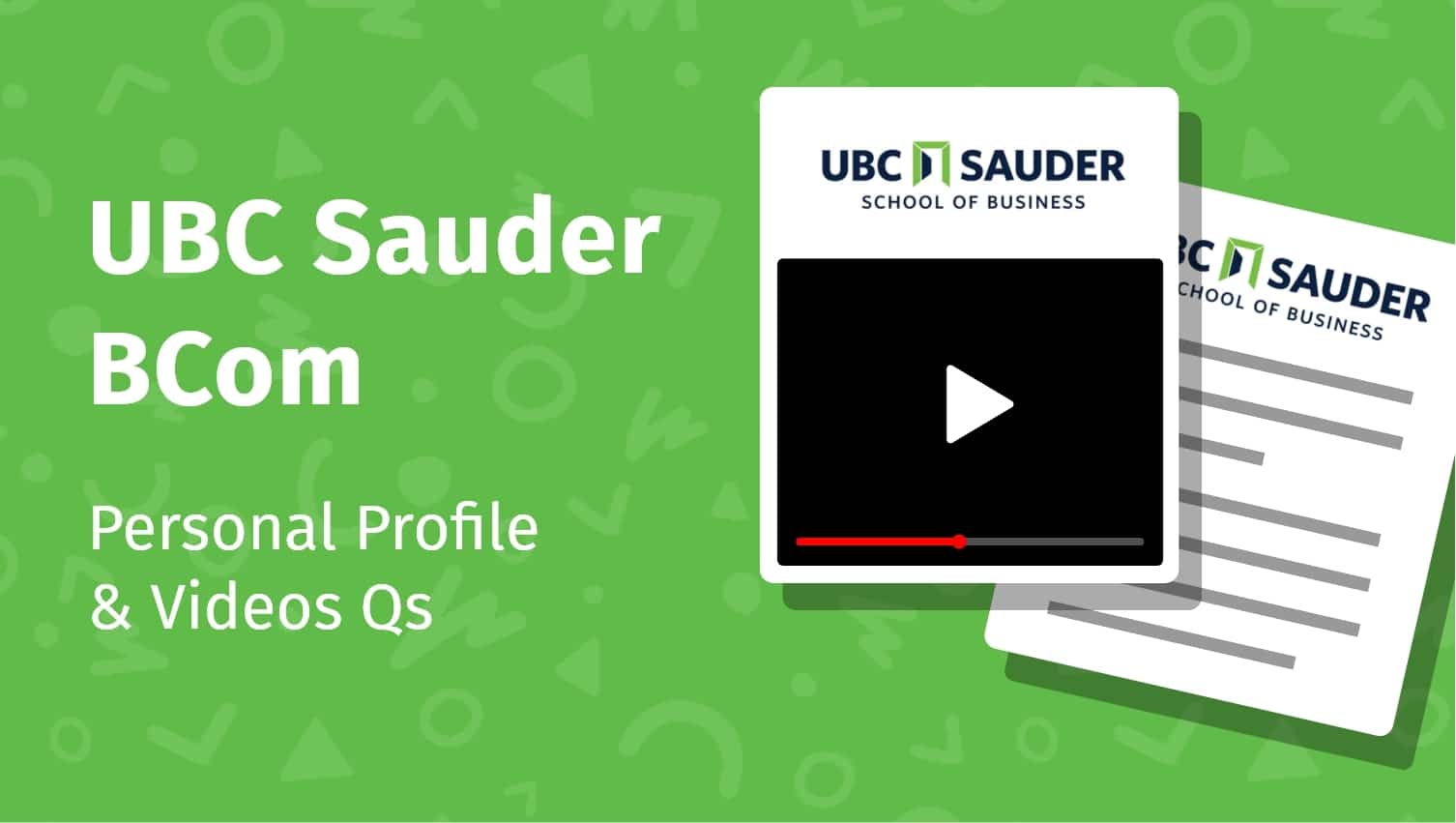
Application Prep
Ubc sauder application: personal profile examples & interview questions 2023-2024.
If you are looking for guidance on the UBC Sauder Commerce (BCom) application, including Personal Profile examples and video interview… Read more
3. SUBSTANCE:
The evaluators want to see that EVERY example, detail, and learning outcome you write about in your answers has a purpose and is meaningful .
They want to see that you’ve really thought about your answers and taken the time to prepare them.
Uniqueness is a HUGE factor here — you don’t want your answers to be basic and the same as everyone else’s. They need to dig beyond the surface and give relevant and interesting insights that other students might not have thought of.
The evaluators also want to see that you’ve built self-awareness and have asked yourself big questions like who you are , what you value , where you want to go , and how you’ll apply the lessons you’ve learned to get there .
If you have filled out our Student Identity Blueprint then this pulling out substance and deep personal insight in your essays will be a lot easier (if you haven’t filled out your Blueprint yet, click here to get started or connect with a coach ).
The evaluators want to see that you can communicate your ideas in an authentic and memorable way , using storytelling, emotional connection, and character development .
They want to see your personality and voice jump off the page — NOT the same generic essay over and over.
This might seem obvious, but a lot of students don’t know how to articulate their ideas in a genuine way that showcases who they are and explains what makes them different .
Once your Profile has been evaluated according to these criteria, it is compared with other students’ Personal Profiles . Then this score is applied to your overall admission average as well as other admission criteria (e.g. video interview), if applicable.
How to Use this UBC Personal Profile App Prep Guide
In this guide, we will provide breakdowns, templates, and examples for all 6 Personal Profile Questions.
IMPORTANT : The program you’re applying to might not ask you to answer all 6 questions (or some of the questions might be slightly different) or it might have some slight variations on the questions listed below. Make sure you read the ENTIRE application to make sure you aren’t missing anything for your program. For program-specific guidance, connect with a coach any time for support.
As mentioned above, all our templates use our Narrative Communication & Deductive Communication Approaches, so you can see what an effective structure looks like for the answers. We will use both approaches throughout this guide. Choose whichever approach you’re most comfortable with (or connect with a coach for support ).
We will use UBC Personal Profile templates and examples from the UBC Sauder BCom Personal Profile to show you what essays using the Narrative Approach look like. We have adapted these essays into the Deductive Approach structure so that you can see examples for this communication style as well.
Ace your UBC Personal Profile.
UBC Alumni & Youth Coach™

2022/2023 UBC Personal Profile Questions & Examples
Here are the UBC Personal Profile questions , as well as answer examples.
REMEMBER : The program(s) you’re applying to might include some or all of these questions (or some questions with slight variations). Make sure you read the entire application carefully to make sure you don’t miss anything! You can also connect with us for program-specific guidance .
UBC Personal Profile Answer Examples – Question 1
“Explain how you responded to a problem and/or an unfamiliar situation. What did you do, what was the outcome, and what did you learn from the experience? (Maximum 1,500 characters)”
UBC Personal Profile Question 1 – Breakdown
As the first question in your Personal Profile, this is where you have the opportunity to make a strong first impression .
This question prompts you to discuss a meaningful experience , where you were required to address a challenge or uncomfortable situation. The important thing here isn’t so much what the situation was, but how you handled adversity and what you learned from it .
Maybe you learned a new strategy for being a leader, or you saw the benefits of getting outside of your comfort zone, or you learned something about yourself.
Go beyond the surface and try to think of a problem/unfamiliar situation that will allow you to provide deep insight and self-awareness. Be as unique as possible, drawing out a learning outcome that is unexpected and memorable.
COACH’S TIP : Paint a vivid and detailed picture as much as possible, showing who you were before this problem and/or unfamiliar situation happened, and then what your initial reaction was, and how you resolved it. Let your personality shine through, while taking the reader on the journey with you.
Choose only experiences where you have a clear learning outcome that has changed who you are and how you view the world . You want to make sure that your answer has substance.
The reviewers want to see that you’ve really thought about why this learning outcome is important and how it can be applied to your life today (and in the future). If you can do this, we guarantee that your essay will stand out from other applicants. Not sure how to communicate your personal growth and learning in essay questions like these? Our Narrative Communication Guide and Deductive Communication Guides are a great place to start, and you can also connect with a coach to take your essay response to the next level.
UBC Personal Profile Question 1 – Template
Our template doc has BOTH the Narrative Approach (starting on p.1) and Deductive Approach (starting on p.9) templates listed below.
REMEMBER : There is a 1,500 character limit for this answer.
Here’s a template that follows our Narrative Communication Approach :
- Quickly capture the reader’s attention and set up the essay so they know what to expect.
- Set the scene with who you were before this problem/unfamiliar situation happened using the 5Ws (Why, What, When, Where, Why). If you can, focus on explaining who you were before this problem/situation occurred, like what you believed in, valued, etc.
- Describe the problem/unfamiliar situation and exactly what happened. Paint the picture vividly with your words and try to give enough detail so the reader feels like they are there with you. Briefly describe your emotions when this problem/situation occurred.
- Discuss how you responded to this problem and/or unfamiliar situation, how you solved it, and what the end result was (this is the ‘after’ scenario that you introduced in the Context section).
- Provide deep insight into some specific learning outcomes that occurred during this experience. Focus on 1-2 themes, while providing specific examples of the impact this experience had on your life today. Finally, write 1-2 sentences about how this experience will help you as a UBC student.
Here’s a template that follows our Deductive Communication Approach :
- State what the problem and/or unfamiliar situation was, and briefly how you responded to it initially.
- Explain why you had the initial reaction you did, and how you solved the problem and/or address the unfamiliar situation. Paint the picture vividly with your words, and give enough detail so the reader feels like they are there with you.
- Provide examples of what happened as you were working to resolve the issue, such as any roadblocks you faced, skills you used to make things easier, how you addressed them, and what the final outcome was.
- Provide deep insight into some specific learning outcomes that occurred during this experience. Focus on 1-2 themes, while providing specific examples of the impact this experience had on your life today. Finally, write 1-2 sentences about how this experience will help you as a UBC student.
UBC Personal Profile Question 1 – Example
Here are some examples of how to answer this question, using BOTH of our communication approaches.
REMEMBER : This is an EXAMPLE ONLY and is NOT meant for you to copy. Why? First and foremost, this is plagiarism and is a serious offense . Plagiarizing these essays will result in immediate disqualification from the admissions process . This can be easily detected using technology and application reviewers are usually trained and/or able to spot when an application isn’t original and does not align with an applicant’s background, personality, values, etc.
Example 1: From UBC Sauder Personal Profile Prep Guide, following the Narrative Communication Approach :

Example 2: Here’s an example of the same essay, but following the Deductive Communication Approach :
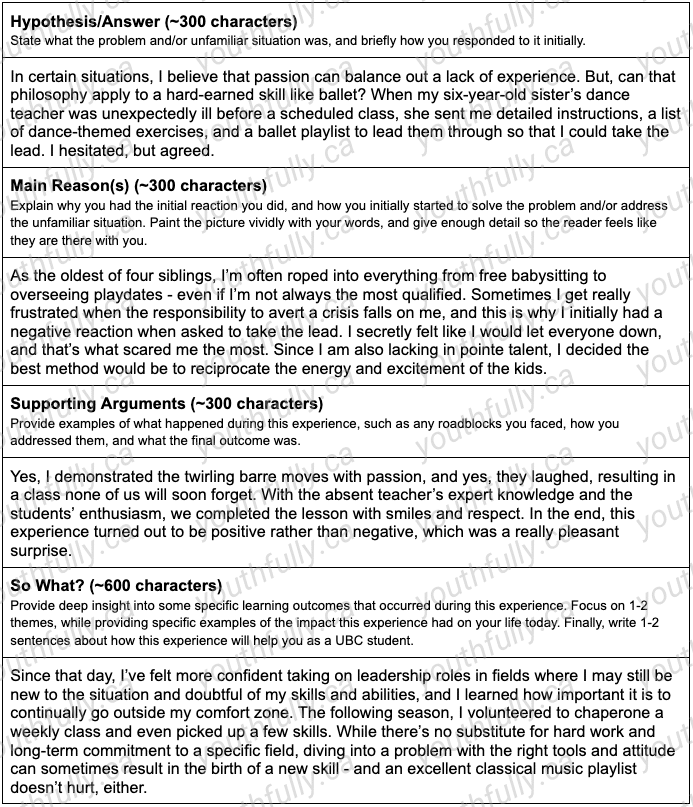
Program Guide
Ubc sauder school of business bcom: a definitive guide for applicants (2024).
This guide is for you if you’re thinking about applying to the Bachelor of Commerce (BCom) program at the UBC… Read more
UBC Personal Profile Answer Examples – Question 2
“Give us an example of how the pandemic has changed your involvement in the community or group most important to you. What have you learned from this experience? (Maximum 1500 characters)”
COACH’S TIP : Last year, the second question in the UBC Personal Profile was: “Give us an example of how the pandemic has changed your involvement in the community or group most important to you. What have you learned from this experience? (Maximum 1500 characters)”. If you come across this question and need some help with it, check out our breakdown, template, and example in our UBC Sauder App Prep Guide here .
UBC Personal Profile Question 2 – Breakdown
Our society is by no means uniform — and that’s what makes it so amazing.
Whether you’re walking around downtown Toronto or taking a day trip to your favourite neighborhood in Vancouver, you’ll see people from all different backgrounds, cultures, religions, sexual orientations, economic standings, etc.
This is exactly what a ‘diverse society’, as outlined in this question, means. A diverse society is a society that’s made up of all types of people with different ethnicities, races, genders, languages, religions, etc., as well as in thought processes, opinions and ideas, life experiences, values, and more.
Diversity also extends far beyond your community or city .
When you scroll through Instagram or Tik Tok, you’ll see posts and videos of people from all around the world showcasing their unique culture, experiences, and interests. In this way, social media has created a ‘global society’ that connects us all. More than ever before, we have access to other ways of life, and this can help us learn, grow, and contribute to this connected society.
A key part of diversity is also inclusion , or accepting everyone’s differences and making an effort to ensure that each person is valued and respected for who they are .
Now that you have a good understanding of what this question means by a global and diverse society, try to think about some ways that you’ve seen diversity (and inclusion) in action.
During your extracurricular involvement in your community, you’ve undoubtedly come across all types of people with difference backgrounds, perspectives, experiences, culture, ideas, language, sexual orientations, etc. And you’ve probably had the chance to share yours as well.
When writing this essay, we recommend choosing one extracurricular experience you had in your community within the last couple of years, when you worked or interacted with a diverse group of people. Maybe it was a fundraiser where you had to work as part of a team or an initiative you joined to help a part of your community that was in need.
You also want to choose one that was particularly meaningful — it should be one that initiated personal growth and changed your view of the world and the people living in it.
Maybe you realized that diverse perspectives actually make a team stronger because they open up various avenues of interpretation when dealing with setbacks and conflict. Or, perhaps you were part of a community project that initiated meaningful dialogue about an important issue or equipped you with the tools you needed to become a responsible global citizen.
Pick an experience where you challenged your views of yourself , and one that taught you something about the world you live in.
The key here is to think about how your community involvement has opened your eyes to new perspectives and will inform your views on diversity going forward. Focus on 1-2 key takeaways (or themes) that you can use as tools in the future to help you become a better person, global citizen, and leader.
Need some help figuring out which community involvement experience to choose? Connect with a coach for support.
UBC Personal Profile Question 2 – Template
REMEMBER : There is a 1,500 character limit for this answer. Here’s a template that follows our Narrative Communication Approach :
- Quickly capture the reader’s attention and set up the essay so the reader knows what to expect.
- Describe how you are active in your community, and how this involvement has allowed you to work with a diverse group of people. Use the 5Ws (who, what, when, where, why) to provide the reader with enough information that they get a good sense of this activity and your involvement.
- Talk about a situation, conflict, or experience where diversity played a significant role, and discuss exactly what that role was. Be as specific as possible and describe your emotions as much as possible here to create a memorable connection with the reader.
- Discuss how the situation you described in the Catalyst section turned out. Describe how you (and/or your team) used diversity to your advantage to generate a positive outcome. Use qualitative data (e.g. money raised, hours volunteered, people helped, etc.) as proof for the big impact your efforts had.
- Talk about 2-3 ways that your community involvement and the experience you discussed above have influenced you and changed your outlook on the world and your place in it. Describe how these learning outcomes have impacted you going forward and will help you navigate this complex world in the future and as a student at UBC Commerce.
- Briefly discuss ways that you (and/or your team) used diversity to your advantage to generate a positive outcome. Refer to specific qualitative data (i.e. exactly what you did, hours volunteered, money raised, etc.) to communicate the impact of your efforts.
- Give 2-3 examples of how taking part in this activity has prepared you for the future in this complex world, and how your view of diversity and a global society has changed as a result of you taking part in this activity.
- Talk about 1-2 ways that your community involvement and the experience you discussed above have influenced you and changed your outlook on the world and your place in it. Describe how these learning outcomes have impacted you going forward and will help you navigate this complex world in the future and as a student at UBC.
UBC Personal Profile Question 2 – Example
Here are some examples of how to answer this question, using both of our communication approaches.
REMEMBER : Please note that all of the examples in this guide are EXAMPLES ONLY and are NOT meant for you to copy.
Example 1: From UBC Sauder Ap p Prep Guide, following the Narrative Communication Approach :
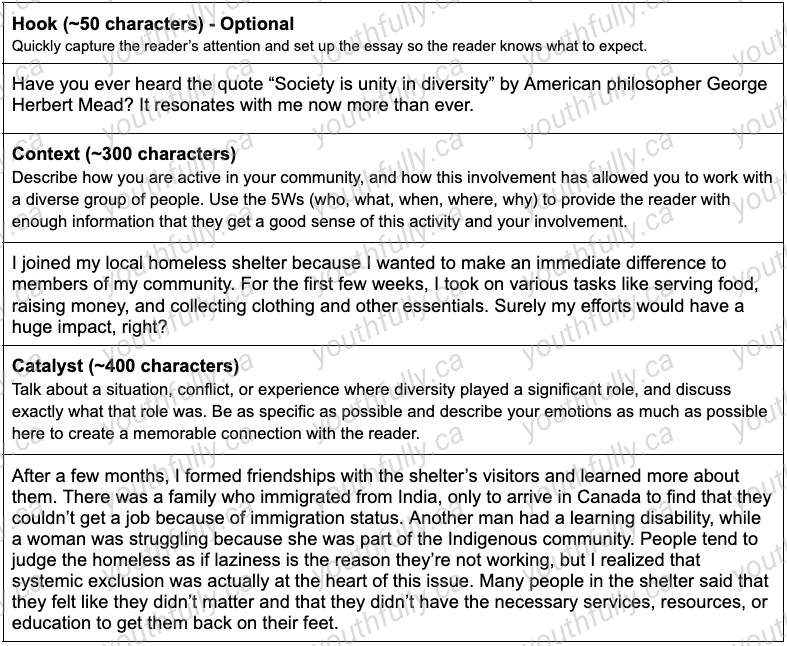
Need some help choosing an extracurricular experience to focus on in this essay? Connect with a coach for support.
UBC Personal Profile Answer Examples – Question 3
Tell us about who you are. How would your family, friends, and/or members of your community describe you? If possible, please include something about yourself that you are most proud of and why. (Maximum 1500 characters)
UBC Personal Profile Question 3 – Breakdown
This question is asking A LOT, in a REALLY limited space.
With so many topics to address, things can get pretty disjointed and chaotic if you aren’t careful.
To help you make an organized and articulate answer , we recommend tackling this question in the following way.
First, identify 1-2 themes that will unify the entire essay . This can be anything from a hobby or research interest, to a skill/value , extracurricular activity, or an audacious goal you’ve set/achieved.
Next, answer each of these 3 components , highlighting your theme(s) wherever possible:
- Introduce Yourself : Think of this component as your pitch to convince the evaluators why you’re a standout applicant who is the PERFECT fit for UBC. 🙂 Limit yourself to 1-2 memorable and unique facts that can be used to differentiate you from other applicants. You can talk about things like notable achievements and/or hobbies, unique experiences, things you value, skills you’ve worked on, etc.
- How People Describe You : Provide 1-2 adjectives that best describe you, providing direct quotes, feedback you’ve received, etc. wherever possible. This can be from friends, family, role models, a teacher, a coach — anyone whose opinion you value.
- Something You’re Proud of and Why : State a unique accomplishment that highlights the facts/adjectives you mentioned above in action, as well as the skills it took to get you there. Then, answer why you’re so proud of it and what you learned because of it.
Remember that your theme(s) is the focus of the entire essay , while the details in the 3 components listed above (e.g. facts about you, your experiences, personal anecdotes and insight, and lessons you’ve learned) give more details about how the themes relate to you and why they’re an inseparable part of who you are.
For example, say the overall theme of your essay is perseverance/determination, as well as your interest in entrepreneurship and software development.
You would start with the first component (i.e. introduce yourself) and talk about how you are a resourceful and independent person, who does whatever it takes to reach a goal once it has been set. You could say that this determination comes from your parents, who immigrated to Canada when you were 2 years old, and always taught you the value of working hard and going after what you want. After being inspired by their success as small business owners, you decided to pursue your interest in entrepreneurship.
Then, in the second component (i.e. how people describe you), you might say that your friends and family describe you as being very sure of yourself and confident in your abilities, which they saw when you started your own cyber security entrepreneurial venture. After seeing the struggles you went through, as well as all the late nights and trial and error, they realized how determined you were to go after your dreams.
Finally, for the third component (i.e. something you accomplished), you could say that the thing you’re most proud of is taking your small business from nothing to having over 20 clients and generating over $10,000 in sales in just a few months. You learned that a big part of perseverance/determination is learning to receive constructive criticism, while maintaining authority as a leader, and being open to evolve.
Here, you can see that the student provides a ton of details about himself (e.g. his family, immigrating to Canada, his interest in business, his organizational and leadership skills, etc.), while answering every component of the question. The theme of perseverance and entrepreneurship unifies and creates a focus for the entire essay, so that all the details are clear and organized.
We know that such a complex question might seem a bit intimidating at first, but if you break it down into smaller sections it’s much more manageable. We also recommend that you connect with a coach to help you choose unique and authentic themes, and help you articulate your interests, skills, experiences, and goals in a memorable way.
UBC Personal Profile Question 3 – Template
Here’s a template that follows our Narrative Communication Approach :
THEME(S):
- Capture the reader’s attention and give a quick preview of what’s to come.
- Briefly answer the question “Tell us who you are”, listing 1-2 notable facts that are an inseparable part of who you are (remember to use your theme as a focus). Provide 1-2 short sentences for each fact, giving enough detail that the reader can get a clear sense of who you are and your personality. You can start the essay with a statement like “I am…”, “I enjoy”, “I am passionate about”, “I value”, etc.
- Discuss how your friends and family would describe you, using 1-2 adjectives (which also relate back to your main theme). Use direct quotes or feedback you’ve received from people here as evidence.
- Describe an experience or two as evidence for why people would feel this way about you (e.g. volunteer work, social initiatives, extracurriculars, etc.), and make it an accomplishment you’re particularly proud of. Describe the outcome of the experience you noted above, using quantifiable facts (e.g. money raised, hours volunteered, people helped, etc.), as well as the skills it took to get you there. If you don’t have a specific experience in mind, mention another achievement or accomplishment or are particularly proud of, as long as it relates to the theme of your essay.
- Discuss what you have learned about yourself (and others) as you’ve explored your personal and academic interests and taken part in the activities you mentioned above. What have your experiences taught you about yourself? How have you evolved as a person? Finally, conclude your essay with a brief statement about how you will use the details you mentioned above to make you successful at UBC.
- Briefly answer the question “Tell us who you are”, listing 1-2 notable facts that are an inseparable part of who you are, while introducing the theme as the focus of your essay. Provide enough detail about your memorable facts that the reader gets a clear sense of who you are and your personality. You can start the essay with a statement like “I am…”, “I enjoy”, “I am passionate about”, “I value”, etc.
- Discuss how your friends and family would describe you, using 1-2 adjectives (which also relate back to your main theme). Describe an experience or two as evidence for why people would feel this way about you (e.g. volunteer work, social initiatives, extracurriculars, etc.). Use direct quotes or feedback you’ve received from people here as evidence.
- Describe the outcome of the experience you noted above, using quantifiable facts (e.g. money raised, hours volunteered, people helped, etc.), as well as the skills it took to get you there. If you don’t have a specific experience in mind, mention another achievement or accomplishment or are particularly proud of, as long as it relates to the theme of your essay.
UBC Personal Profile Question 3 – Example
Example 1: Here’s an example of this essay question, following the Narrative Communication Approach :
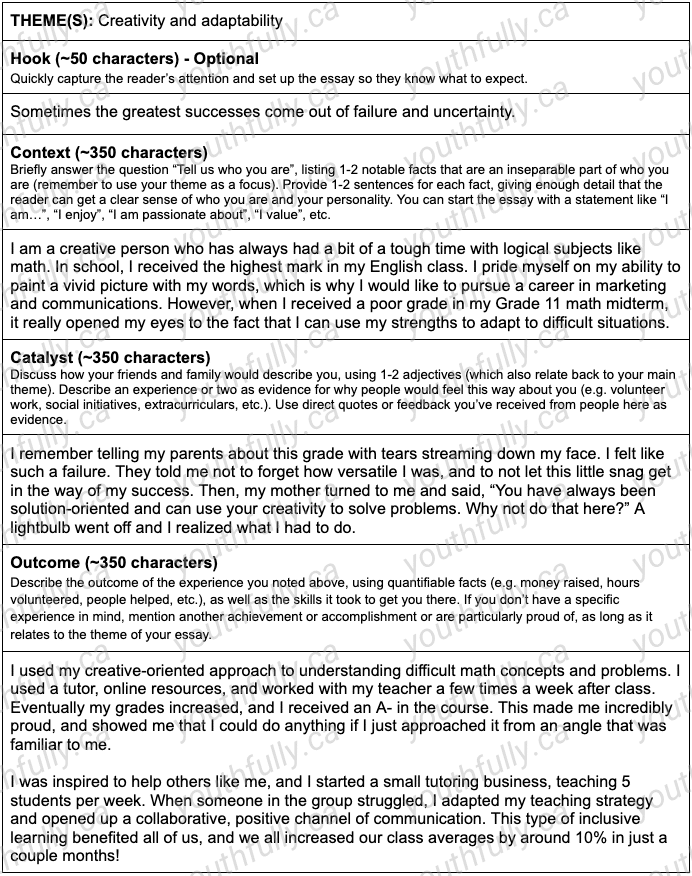
Need some help tackling tough UBC Personal Profile questions like this one? Remember — you aren’t alone!
Our Youth Coaches have helped hundreds of students create unique and authentic essay responses that showcase their skills, experiences, and strengths. Connect with a coach for all the support you need!
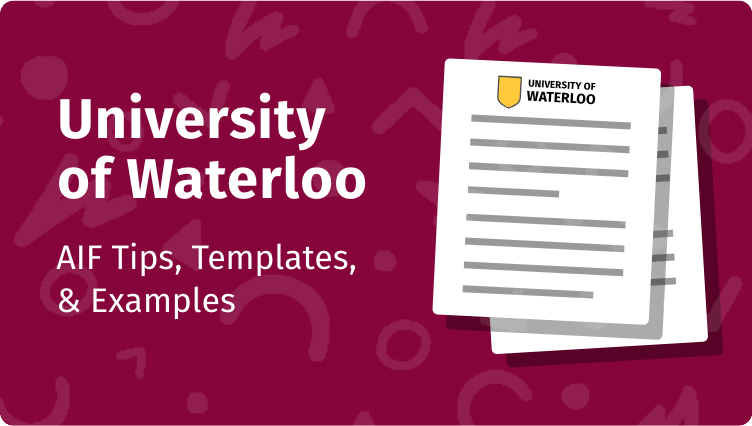
University of Waterloo: AIF Tips, Questions, & Examples 2023/2024
If you’re looking for Waterloo Applicant Information Form (AIF) questions, examples, and prep tips, then you’ve come to the right… Read more
UBC Personal Profile Answer Examples – Question 4
What is important to you? And why? (Maximum 1500 characters)
UBC Personal Profile Question 4 – Breakdown
Unlike Question 3, this question seems pretty straightforward. But don’t be fooled — it’s still asking a lot.
By finding out what is most important to you (and how it became important), the evaluators get a lot of insight into what makes you, you (and whether you’d be a good fit for UBC).
This question is left intentionally broad so you can discuss a wide range of topics like:
- Hobbies and interests
- Extracurriculars
- Competitions
- Community activities
- Social causes
- Role models
- Influential things/people in your life
- Transformational experiences
- Concepts and ideas (e.g. leadership, work/life balance)
When thinking about what you want to discuss, reflect on something that you’re genuinely excited and motivated about , and articulate this passion in your answer. The goal here is to make the evaluators as excited about it as you are.
Perhaps more important than the actual thing you discuss is WHY it’s so important (and how you communicate that).
Think about where you’d be if you hadn’t discovered it, and what life would look like without it.
Take the reader on a journey of how you have pursued this interest over time, the formative experiences you’ve had while doing so, and the positive things that have resulted from it.
Remember that an important part of the UBC Personal Profile evaluation rubric is focusing on learning outcomes, so you should always list around 2-3 life-changing things you’ve discovered about yourself along the way.
Finally, think about how this interest will ultimately make you a better student, and how you will continue to explore this interest at UBC. Do some research about specific clubs, programs, courses, etc. that will allow you to continually explore this interest and contribute to the UBC community as a whole.
Need some help deciding which topic to discuss for this essay question? We can help!
UBC Personal Profile Question 4 – Template
- State what is important to you. Answering the 4Ws (who, what, when, where) as much as possible so you provide enough information that the reader knows exactly what you are talking about. Discuss how it became so important to you (i.e. was there a specific event, time, or person where your interest started?).
- Describe what happened as a result of you pursuing it, such as skills you built, people you met, a career path you discovered, a goal you achieved, etc. Focus on 1-2 ways that it has impacted your life, and think about what your life would look like if you hadn’t discovered it. Briefly discuss any plans you have in the future to continue to pursue this area of interest.
- Talk about 1-2 learning outcomes that have occurred because of this interest. Answer questions like: How have I changed over time? How has it influenced my life? How has it changed my worldview and values? Conclude by briefly stating how this interest (and your learning outcomes) will help you succeed as a student at UBC.
- State what is important to you. Answering the 4Ws (who, what, when, where) as much as possible so you provide enough information that the reader knows exactly what you are talking about.
- Describe what happened as a result of you pursuing this interest, such as skills you built, people you met, a career path you discovered, a goal you achieved, etc. Focus on 1-2 ways that it has impacted your life, and think about what your life would look like if you hadn’t discovered it. Finally, draw on your experiences cultivating this interest and how your interest has grown or changed over time. Briefly discuss any plans you have in the future to continue to pursue this area of interest.
UBC Personal Profile Question 4 – Example
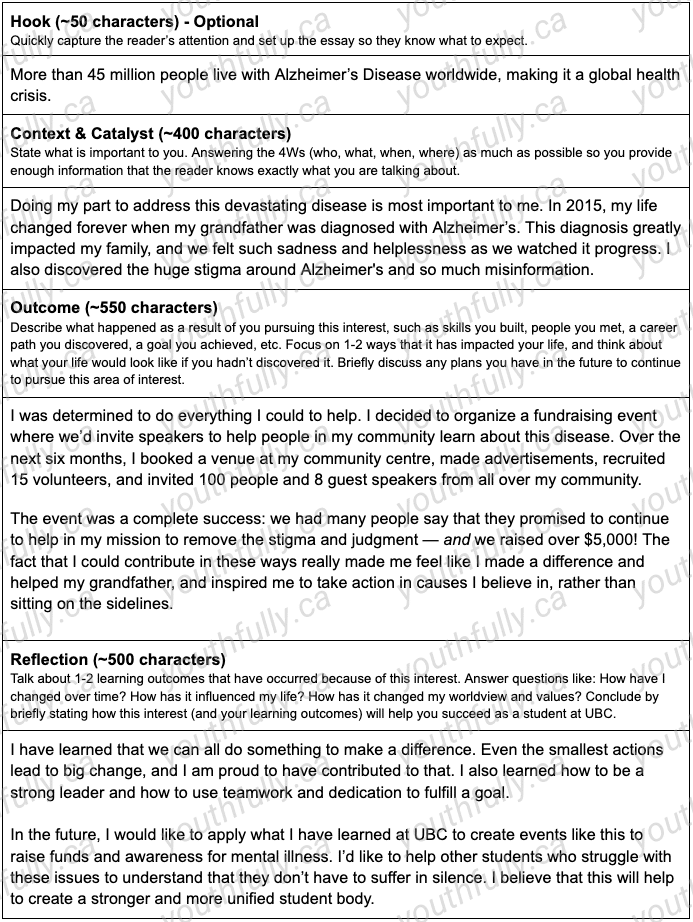
Example 2: Here’s an example of this essay question, following the Deductive Communication Approach :
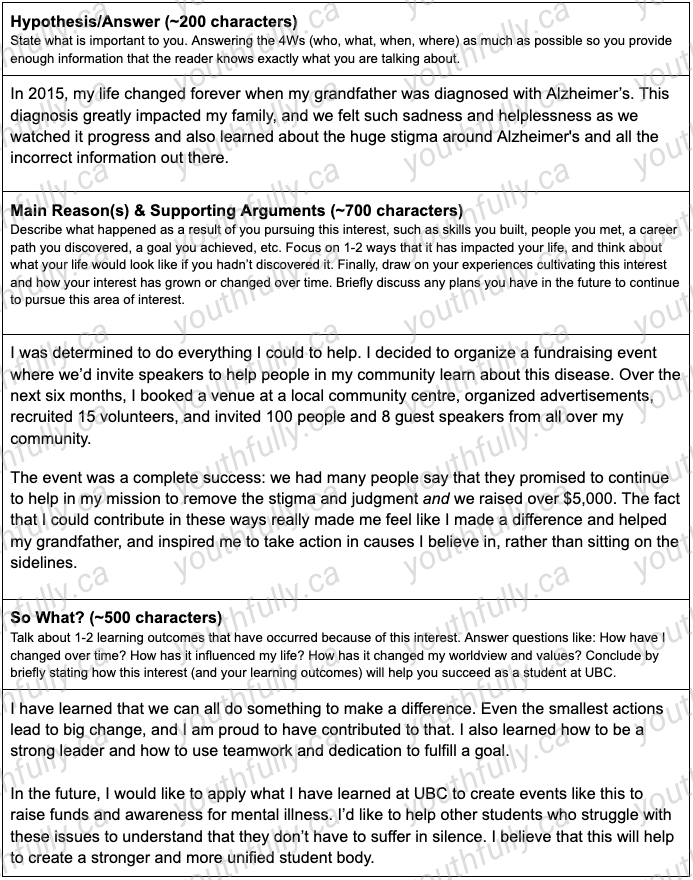
UBC Personal Profile Answer Examples – Question 5
List up to five activities or accomplishments in one or more of the following areas:
- Creative and performing arts
- Family and community
- Service to others
- Volunteering
- Work or employment
- Other
UBC Personal Profile Question 5 – Breakdown
UBC wants to see a broad range of activities in your Personal Profile, both inside and outside of school.
Choose extracurricular activities (like volunteer work or being a President of your school’s debate club), hobbies (like learning a new language), interests (like competitive swimming at your local community center), and/or general activities you enjoy doing with your family, friends, or members of your community (like playing tennis).
COACH’S TIP : As mentioned above, the evaluators DON’T want you to simply list a bunch of activities you have done. Instead, they want you to talk about activities and experiences that have created learning outcomes that have profoundly shaped who you are as a person, while communicating these lessons in a unique, authentic, and memorable way (this will be especially important for the next question, which we will discuss more below).
Choose up to 5 activities that will show the depth and breadth of your experiences. We call this the T Model (learn more about it here ).
Here, you have 1-2 big activities that you’ve put a lot of time and effort into (this is the depth, or the vertical part of the ‘T’). For example, this could be a non-profit you started in your community, a fundraising event you organized to help address homelessness in your community, or giving a TEDx talk on an issue you are passionate about. These are BIG accomplishments that you’re super proud of. These should be the first ones in your Personal Profile, so you can wow the committee from the beginning. 🙂
Next, you’ll have 2-3 activities that take less time and effort, but are still super important for helping shape who you are (this is the breadth, or the horizontal part of the ‘T’). For example, these could be an online course you took that ignited your interest in finance management or a summer internship you did that helped you develop your communication and leadership skills.
Structuring your activities in this way will show the evaluators that you have well-rounded experience in many areas.
We know that identifying (and participating in) activities like this can be difficult, especially if you don’t know where to start. But don’t worry, we’ve got your back. Our unique approach will help you and your coach identify and execute audacious and authentic goals (we call these AYA goals) that are perfectly aligned with your interests and passions , so you can accomplish what you want (and have amazing experiences to talk about on your application). Connect with a coach to get started and check out our Goal-Setting Guide now.
UBC Personal Profile Question 5 – Template
REMEMBER : There is a maximum of 300 characters per activity .
For this question, you will be asked for the following information:
- Activity Type : State what this activity is, using the list above. If your activity isn’t mentioned in that list, write a 1-2 word description.
- Start Date : State when you began this activity (month/day/year)
- End Date (optional): State when you completed this activity (month/day/year). If you are still doing it, leave this blank.
- Ongoing (optional): If this is an ongoing activity, check this box.
- Frequency: Select from the dropdown menu how often you participate in this activity (for example ‘Regular Weekly Activity (5-10 hours per week).
- Short Description (max 300 characters): Briefly describe your role in this activity and what it was for (e.g. President of your school’s economics club). Then, describe what you did, as well as what quantifiable outcomes (i.e. money earned, hours dedicated, etc.) and what you learned as a result of taking part in this activity (if you have space).
COACH’S TIP : On the EducationPlannerBC site, you will have to add each activity individually to your profile. Our template will ensure that you have all the correct information beforehand so you can have everything prepared and proofread.👍
UBC Sauder Personal Profile Question 5 – Example
Here’s an example of a list of activities for this question :
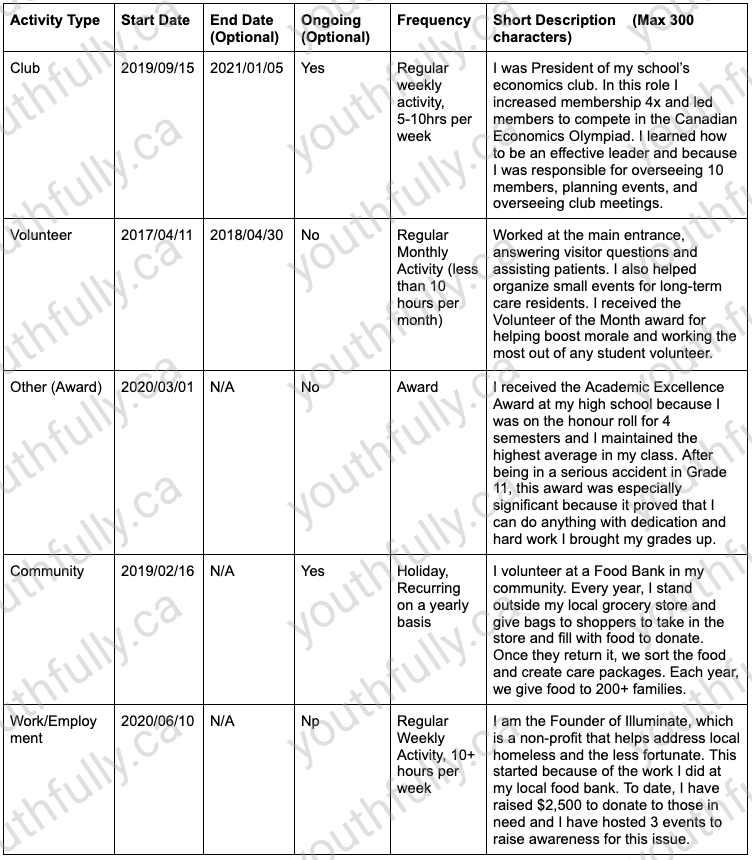
Find the mentor you’ve been looking for.
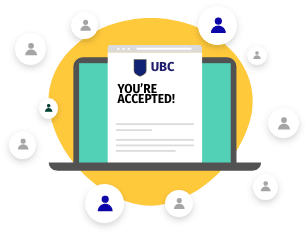
UBC Personal Profile Answer Examples – Question 6
Tell us more about ONE or TWO activities listed above that are most important to you. Please explain the role you played and what you learned in the process. You will be asked for a reference who can speak to your response. (Maximum 2100 characters)
UBC Personal Profile Question 6 – Breakdown
This question gives you the chance to discuss further insight into the impact your experiences have had on you and how the lessons they taught helped shape who you are .
We recommend choosing 1 activity to write your essay on so that you can provide enough detail and create a memorable and unique story.
However, if you have two activities that both helped you discover a similar learning outcome , then you can write about 2.
For example, if you volunteered to help organize a fundraising event for Alzeheimer’s research and awareness, you could talk about why you took on this role, and then the leadership skills, time management, team work, and problem solving skills you developed along the way. Talking about this one activity using the template below is perfectly fine. However, let’s say you with the help of your Youth Coach you took your goals to the next level and started your own non-profit to continue the journey to fund research for this disease. This would be a great opportunity to discuss two activities because it shows your dedication and your evolving leadership and interest in entrepreneurship and business.
It’s also important to choose an activity that you genuinely care about , so that you can convey your passion to the evaluators, along with what you learned. Your experiences make up what you value and what you care about. If you completed your Student Identity Blueprint™ , it will be really easy to choose activities that align to your Nurtured Values and communicate these values in your Personal Profile. If you haven’t filled out your Blueprint, connect with a coach to get started.
COACH’S TIP : Make sure you give your reference a heads up that UBC might contact them. Discuss the activity you were involved in, as well as your role, responsibilities, and what you learned as a result of that experience. You can even email some talking points for them to use if they’ve contacted. You don’t want your essay to give one learning outcome and then your reference to give another, so take the time to make sure the messaging is aligned.
Finally, when discussing what you learned in the process, make sure you really focus on the qualities that UBC looks for in its students , like leadership, community involvement, team work, and a passion for the field you’re applying to.
If you need help deciding which activity from Question 5 to choose, connect with a coach for support. They can help you write an authentic and memorable response that will help you stand out from other applicants and increase your chances of admission success.
UBC Personal Profile Examples Question 6 – Template
REMEMBER : There is a 2,100 character limit for this answer.
- State the activity that you are discussing from the list you gave in Question 5. Describe what you did in that activity (i.e. your role, responsibilities, etc.). Try to answer the 5Ws (who, what, when, where, and why).
- Describe who you were before you started this activity and how your interests, values, etc. evolved while you were doing it. This can be a specific event that occurred while you took part in this activity or change over time. State some quantifiable outcomes that occurred as a result of your participation in the activity (e.g. money raised, hours devoted, etc.).
- Describe how this experience allowed you to learn and grow as a leader and student (this is the ‘after’ picture that you started in the Catalyst section). Provide deep insight and a unique learning outcome. Focus on 1-2 themes, while providing specific examples of the impact this activity had on your life today. Finally, briefly state how you will use this learning at UBC.
- State 1-2 activities that you listed in Question 5. Describe what you did in that activity (i.e. your role, responsibilities, etc.). Try to answer the 5Ws (who, what, when, where, and why).
- Describe how this experience allowed you to learn and grow as a leader and student (this is the ‘after’ picture that you started in the Main Reasons section). Provide deep insight and a unique learning outcome. Focus on 1-2 themes, while providing specific examples of the impact this activity had on your life today. Finally, briefly state how you will use this learning at UBC.
UBC Sauder Personal Profile Question 6 – Example
Example 1: From UBC Sauder Personal Profile Prep Guide, following the Narrative Communication Approach . This example is from the list of activities in Question 5, from a student who was the President of their school’s economics club.
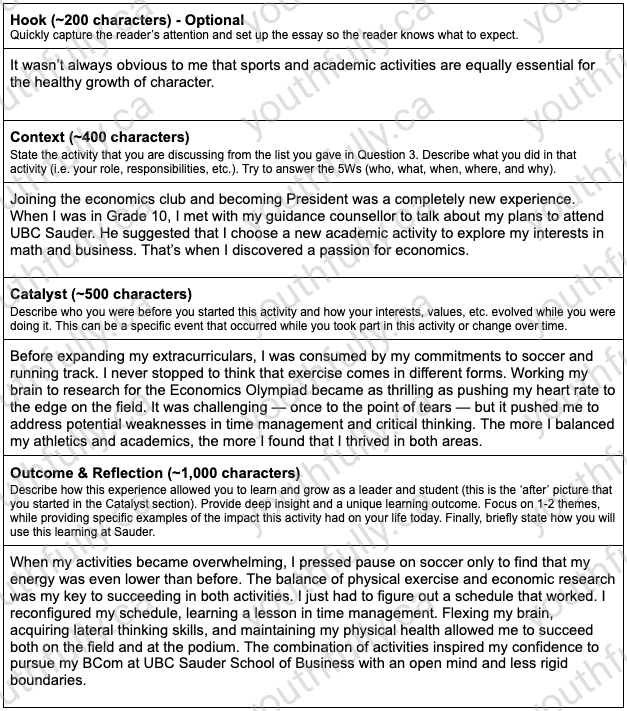
Need some help writing essays that describe your extracurriculars and what you learned? Connect with a coach for support.
UBC Personal Profile Answer Examples – Question 7
Additional Information (Optional): You may wish to use the space below to provide UBC with more information on your academic history to date and/or your future academic plans. For example: How did you choose your courses in secondary school? Are there life circumstances that have affected your academic decisions to date? What have you done to prepare yourself specifically for your intended area of study at UBC? (maximum 600 characters)
UBC Personal Profile Question 7 – Breakdown
So far in your Personal Profile, you’ve given the admissions committee some insight into your experiences and achievements inside and outside of the classroom with volunteer opportunities, extracurriculars, and various other activities.
All of these questions show how you undertake responsibilities , deal with setbacks when they arise, and have grown as a person along the way. Think of this as the development of your interests and passions through the activities you are involved in.
Question 7, on the other hand, focuses less on extracurriculars and other activities, and looks inside the classroom . Here, the reviewers want to know how your academic journey has developed your interest in business and led to you applying to UBC.
This question is very open-ended so that you can focus on basically any area that has impacted your academic choices and performance.
If you aren’t sure what to write here (if anything at all), have a look at your Student Identity Blueprint™ to help you identify why your interest in your chosen field began, your achievements thus far, and the skills/values that helped shape this interest (and who you are more generally). If you haven’t already completed your Blueprint, connect with a coach to get started on one.
The most important things to focus on for this question is how your courses in high school helped you develop your interest in your chosen field (and how you’ll continue to explore this at UBC).
You can discuss a gradual development over time or a specific event that changed academic choices/plans, and what you learned about yourself as a result.
Focus on courses that are applicable to the program you’re applying to as much as you can here.
Think about such questions as:
- What made you want to take this course?
- What challenges did you face when you did?
- How did this evolve your interest in your chosen field more generally?
- What skills, like leadership, communication, team work, and problem solving, did you develop along the way, and how?
- How will these skills and experiences you developed help you at UBC, and how?
COACH’S TIP : Use specific details and talk about the emotions you experienced as much as you can. This will help create a unique connection with the reader and transport them into exactly what you felt during the situation/experience you are talking about.
If you are unsure how to approach this question, connect with a coach to find an authentic angle that will emotionally connect with the reviewers while communicating your journey.
UBC Personal Profile Question 7 – Template
REMEMBER : There is a 600 character limit for this answer.
- Provide a brief description of your academic experience, including details like courses you’ve taken, skills you’ve built, and your experiences in high school. Briefly mention how these contribute to your interests and plans for the future (e.g. future studies, career, etc.).
- Describe any experiences, challenges, or setbacks (academic or personal) and discuss how these affected your academic decisions in high school and while applying to university. Emphasize the uniqueness of your experiences and the emotions you felt so that you can be as authentic as possible.
- Talk about what you learned as a result of this experience. How did it help you evolve as a person and student? Provide specific examples that show how what you’ve learned will help you excel at UBC.
- Provide a brief description of your academic history to date and/or your future academic plans.
- Provide some details and examples, like courses you’ve taken, skills you’ve developed, and your experiences in high school. Briefly mention how these contribute to your interests and plans for the future (e.g. future studies, career, etc.).
- Talk about what you learned as a result of your experiences, and how they’ve helped you evolve as a person and student. Provide specific examples that show how what you’ve learned will help you excel at UBC.
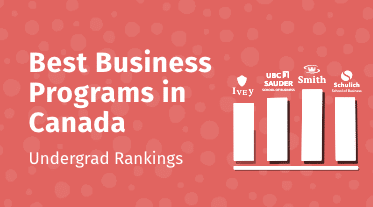
Rankings & Lists
Best business schools in canada 2024 (undergraduate programs).
You’re investing a TON of time, money, and energy towards your future. You’ve gotten the grades, done a bunch of… Read more
UBC Personal Profile Question 7 – Example
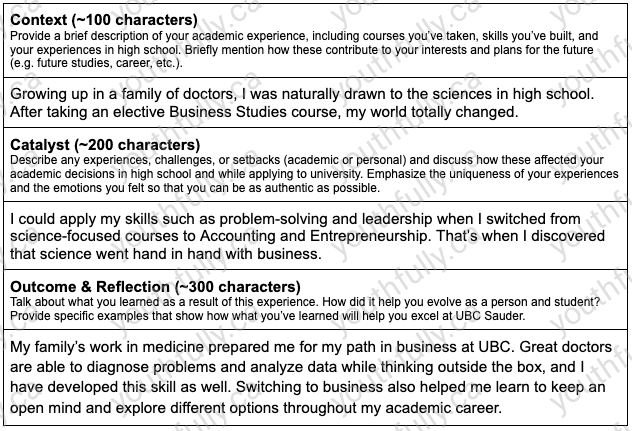
UBC Personal Profile Answer Examples – Question 8
Please submit the names of two referees who know you well and can comment on your preparedness for study at UBC. Examples of referees include an employer, a community member, a coach, a teacher/instructor, or anyone who knows you well. One of the referees you select MUST be able to speak to one of the activities / experiences described in one of your long-answer responses above. For applicants who are currently attending a high school, one of your referees MUST be a school official (e.g. grade 12 or senior year counsellor, teacher, or IB Coordinator). Neither referee should be a friend, family member, or paid agent.
The purpose of this question is so that UBC can verify the activities, experiences, and learning outcomes you discussed in the previous questions.
Before listing the names and contact information for your references, make sure that you ask your references for permission first , so that if they get a call or email from UBC then they’re not surprised.
UBC Personal Profile Question 8 – Template
You will need the following information:
- Relationship
- Email Address
- Phone Number
UBC Personal Profile Question 8 – Example
Here an example of the information for this section:
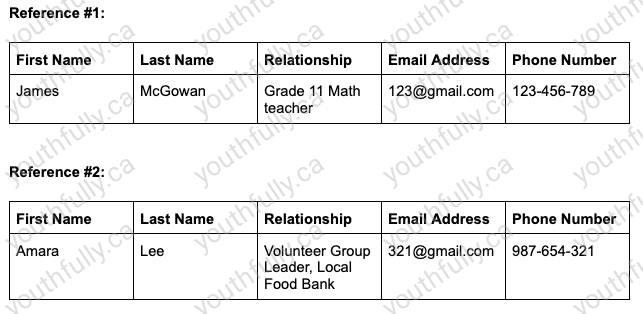
You’ve Got a Dedicated Coach in Your Corner
For over a decade, we have worked with thousands of students to help them achieve more than they ever thought possible.
Our coaches have a strong success rate supporting students as they apply to the University of British Columbia, among other top universities.
Our 1-on-1 Youth Coaching fills that gap that most high schools miss. We can help you build self-awareness through probing questions and assessments, set bigger goals to elevate your extracurriculars and future career plans, and improve skills that matter on supplementary applications, such as interviewing, written communication, critical thinking, and creativity.
We use a coaching methodology, called ‘full student’ development, that’s been proven to increase your chances of admission to top-tier universities and obtaining competitive jobs/internships.
So, what are you waiting for? Fulfill your post-secondary potential with the mentorship and coaching you’ve always wanted!
IMPORTANT : Want to share information and/or images from this resource on your own website, blog, article, etc.? Please ensure you reference content of any kind published by Youthfully Inc., in whole or in part, using the following statement: (1) Our Organization (Youthfully Inc.); (2) The title of our content/resource; and (3) the URL to our webpage where the content was originally posted. For example: “Sourced from: Youthfully Inc., “UBC Personal Profile: Examples, Question Samples, & Prep Tips 2023/2024”,’ https://youthfully.com/ubc-personal-profile-questions-examples-and-tips .” Not doing so is an infringement of copyright and is illegal. We spend significant time developing resources for students, so please take a few seconds to ensure they are referenced properly. Disclaimer : While the information in this blog is considered to be true and correct at the date of publication, and although our team makes every attempt to ensure that the information is accurate and vetted by university staff, Youthfully is not in any way liable for the accuracy of any information printed and stored or in any way interpreted and used by a user.
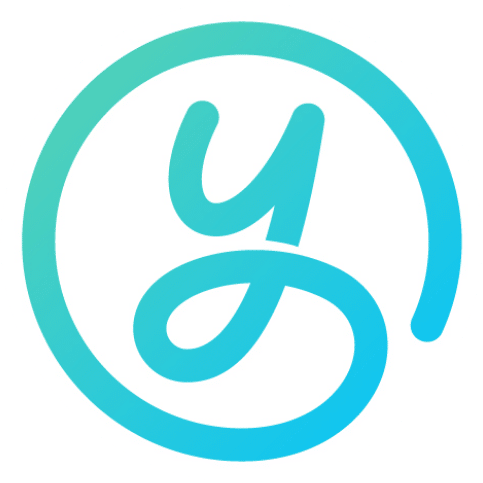
Youthfully is the world's most comprehensive admissions, career, and educational guidance platform. We empower students to unlock their full potential through a holistic, highly personalized coaching approach.
Personal Profile Overview
- What is the Profile?
- Why submit the Profile?
- Evaluation Rubric
- How to use this guide
Personal Profile Q1 & Q2
Personal Profile Q3 & Q4
Personal Profile Q5 & Q6
Personal Profile Q7 & Q8
Get 1-on-1 Support
- Connect With a Coach
Achieve Your Goals
1-on-1 youth coaching for students, youthfully inc..
5020 17 St SW Calgary, AB Canada T2T 6X2

All we need is your email.
We’ll send you free access to the entire course immediately.
We use cookies (yummy!) to optimize your Youthfully experience.
- WRITING CENTER
- CUSTOMER AREA
- Client Reviews
- Our Writers
- Sample Papers
- Study Resources
Get Your Grades Improved by Our Professional Writers - We are Trusted by Thousands of Students!
Global compose inc. constantly employs professional homework writing help writers from usa, uk, ca and au. the writers are highly trained professionals, comprising of 500+ masters and ph.d level writers available 24/7. we assist clients who either have difficulty completing their assignments, sick or in need family time. to get started, submit your instructions., calculate your order price.
Use Discount Code: FIRST5 at Checkout FIRST5 -->
PRICE BEFORE DISCOUNT: $15.00
- Academic Paper Samples
Sample Essay on Personal Profile
Get homework help on this topic - check the quality of writing from this sample, if you are looking for assignment help on this topic or similar topic, click on order now button to submit your details. once we have your order details, your assignment will be assigned to one of our best writers, who will then proceed to write your paper and deliver it within your specified deadline. thank you for choosing us today.
My name is Ali Salem, a freshman at Arizona state college taking a course in criminal justice . The past few years have been life changers to me. After I left high school, I went to live with my uncle in the city as my parents were living up-country where there is no much exposure like in the city (Buller 342). My uncle worked as a court clerk in one of the local courts . Every night he would come to the house with a different story of the criminal cases they handle in the courts. One thing that I figured out from all the stories was that criminal cases were many, and it seemed like many criminals escaped prison due to lack of strong evidence.
That is when I decided that I would pursue criminal justice and to succeed in it I knew I had to do it in reputable college where I would get the best training. Even the movies I watched continued to encourage me to take up criminal law and my uncle supported me on my endeavor. and that is how I decided to apply and got accepted in the Arizona state college to study law , majoring in criminal justice
My goal is to graduate with high grades and be a good lawyer to those who will hire my services in the future. I believe that my time at the college would help me achieve my academic goals before I venture into the world (Murray and Sarah 145). The college has helped me settle fast and I hope to make a good impression by scoring high grades this semester. The college has lived to its expectation and nothing would stop me from achieving my dreams.
Works cited
Buller, Jeffrey L. The Essential Academic Dean: A Practical Guide to College Leadership . , 2007. Print.
Murray, Rowena, and Sarah Moore. The Handbook of Academic Writing: A Fresh Approach . Maidenhead [u.a.: McGraw-Hill/Open Univ. Press, 2006. Print.
Do you have an Assignment on a Similar or Related Topic? We can Help You Right Now! Click on the Order Now button...
Are you looking for homework writing help on this topic? This question was posted by one of our client seeking homework help. If you are therefore looking for an assignment to submit, then click on ORDER NOW button or contact us today. Our Professional Writers will be glad to write your paper from scratch, and delivered within your deadline. Perfect choice for your excellent grades! www.globalcompose.com.
We ensure that assignment instructions are followed, the paper is written from scratch. If you are not satisfied by our service, you can either request for refund or unlimited revisions for your order at absolutely no extra pay. Once the writer has completed your paper, the editors check your paper for any grammar/formatting/plagiarism mistakes, then the final paper is sent to your email.
Writing Features
Affordable Writing Services
Experienced Writing Team
24/7 Team of Writers
Professional E ssay Writers
Quality Measures
Trained Support Team
Non-Plagiarized Papers
Well Researched Papers
Free Writing Resources
Privacy | Confidentiality
We do not share your personal information with any company or person. we have also ensured that the ordering process is secure; you can check the security feature in the browser. for confidentiality purposes, all papers are sent to your personal email. if you have any questions, contact us any time via email, live chat or our phone number., our clients testimonials, a team of +500 masters and ph.d level homework writing help writers available 24/7 cannot get it wrong. the following are customer reviews about the quality of our services..
“Thanks for offering your professional assistance on this one. Topic was confusing but writer worked it out”
Added 24 Minutes Ago
“Thanks, I like the literature review, it is discussed in depth. Have looked at the results section and it is conclusive as I expected. Thank you”
Added 12 Hours Ago
“I like the discussion on the case study. Thank you. Am satisfied and wanted to request that same writer will handle my future assignments”
Added 30 Minutes Ago
“I was paranoid about online writing services, but on this one, the results are evident that you are much better. Will order more papers”
Added 3 Minutes Ago
“I think the paper is alright. If I can book the writer for the soon upcoming assignment, it will be great. Thanks”
Added 6 Minutes Ago
Why choose our homework writing help, we try to work as diligent as we can to help you meet your homework’s deadline. our support staff is always online 24/7 to help clarify any issues or concerns you have regarding our services. talk to us today to find out how our writers may be of help to you., customized papers, we consider your instructions and specifications in order to tailor the paper to suit your expectations., only professional writers, all our writers have a masters or ph.d and are well trained to handle assignments in various disciplines at different education levels., fast and reliable, our writers are capable of handling any assignment with short deadline and deliver without any delay, thus saving you time and energy, round the clock support, our customer support is always ready to offer real time assistance of day and night, through email, live-chat and phone., cost effective prices, we save you money with our affordable prices and huge discounts on all assignments., 100% original papers, all our papers are thoroughly researched and written from scratch. be sure of completely non-plagiarized papers., our ordering process, to get started with our homework writing help, simply click on the order now button. its easy, secure and takes less than 2 minutes to complete. the following steps illustrates the entire process., fill the order form: include all instructions and files for your assignment., submit your payment via card or paypal so that your order can be processed., a writer works on your paper and submits to editors upon completion., the completed paper is examined by our editors, then sent to your email, want to learn from experts check the writing tips below.
Final Paper Assignments
- Thesis Writing Help
- Dissertation Chapters
- Writing Research Papers
- Project Writing
- Term Paper Writing
- Speech Writing
Weekly Assignments
- Essay Writing
- Coursework Writing
- Assignment Writing Help
- Homework Writing Help
- Book Review Writing
- Movie Review Writing
Creative Assignments
- Power Points Preparation
- Analyzing Case Studies
- Creative Writing Papers
- Critical Thinking Writing
- Annotated Bibliography
- Capstone Project Writing
Admission Papers
- Writing Scholarship Essay
- Writing Admission Essays
- Writing Application Essays
- Writing Entrance Essays
- Personal Statement Essays
- Reaction Paper Writing
Samples of our Writing Illustrated Below
We have compiled a list of samples written by our writers for your review. you can use these samples to write your paper. you must however cite the source properly. if you are looking for a non-plagiarised paper, click on the order button. our professionals will work on your order. are you looking for writing tips check the list on this page. we are glad that we could help..
- Discussion Essay Homework
- Dissertation/Thesis Writing
- Book Review Paper
- Business Plan Homework
- Capstone Project Paper
- Creative Writing Homework
- Critical Thinking Homework
- Application Essay Homework
- Case Study Homework
- Literature Review Homework
- Personal Reflection Homework
- Reflection Essay Homework
- Research Proposal Homework
- Annotated bibliography Paper
- Article Review Homework
- Research Paper Homework
- Movie Review Sample
- Term Paper Sample
- Admission Essay Homework
- Argumentative Essay Paper
- Response Essay Homework
A List of Related Papers On This Category is Provided Below
- Sample Admission Essay on Target Corporation
- Sample Paper on Magical Realism
- Sample Academic Research Paper on Cover Letter Analysis and Genre Conventions
- Sample Essay Assignment on Typhoon Haiyan
- Sample Admission Essay on Self-Assessment of My Poster Presentation
- Sample Academic Paper on Finland’s Educational System Is Far Better Than The U.S
- Sample Paper on Lifespan: how people change with time
- Sample Essay on Auditing and Evaluation of Public Companies
- Sample Essay on SWOT analysis of Marshalls
- Sample Essay on SWOT Analysis of Staples Inc
- Sample Paper on Macro Social Work
- Homework Sample Paper on Resource Schedule
- Sample Research Paper on Current Events Impact the School Counseling Profession
- Sample Dissertation Chapter Paper on Police Response to Victims of Domestic Violence
- Sample Academic Paper on Essay writing
- Sample Essay on SWOT Analysis of Sears Canada
- Sample Academic Paper on Towards an Accessible Education for Learners with Disabilities on a Critique Policy Framework.
- Sample Essay on the Conflict between the US Airlines
- Sample Essay on Cybercrime and Criminal Justice in Australia
Get your Homework Written by our Top-Notch Writers Now
Judge denies Trump bid to dismiss classified documents case using Presidential Records Act
A judge Thursday denied former President Donald Trump's bid to dismiss a case alleging he mishandled classified documents , rejecting his argument that the papers were considered personal under the Presidential Records Act.
The charges against Trump "make no reference to the Presidential Records Act, nor do they rely on that statute for purposes of stating an offense," U.S. District Judge Aileen Cannon wrote.
"For these reasons, accepting the allegations of the Superseding Indictment as true, the Presidential Records Act does not provide a pre-trial basis to dismiss," the judge wrote, raising the possibility the defense argument could be used later.
Cannon had asked both sides to address the argument that the national security documents could be considered personal in proposed jury instructions, an argument special counsel Jack Smith's office argued was " fundamentally flawed ." The judge said in her Thursday ruling that Smith's demand she decide the issue now is "unprecedented and unjust."
Cannon disputed that her order soliciting preliminary draft instructions was anything but "a genuine attempt, in the context of the upcoming trial, to better understand the parties’ competing positions and the questions to be submitted to the jury in this complex case."
The Presidential Records Act requires the return of presidential records at the end of a president’s term, but says they can keep their personal records, which is described as documents containing “highly personal information, such as diaries, journals, and medical records.”
In a filing Tuesday, Smith's office said Cannon's proposed instruction on Trump's broader interpretation of the law would essentially result in the jury being told to accept Trump's defense, which it maintains is a fiction.
“Trump’s entire effort to rely on the PRA is not based on any facts,” prosecutors said. “It is a post hoc justification that was concocted more than a year after he left the White House, and his invocation in this Court of the PRA is not grounded in any decision he actually made during his presidency to designate as personal any of the records charged.”
Cannon's request last month for the proposed jury instructions incorporating Trump's PRA was unexpected. It came after a hearing where the judge had seemed highly skeptical of the defense, and it also came as there's no firm trial date for the case to begin.
The trial is scheduled to begin May 20, but the judge has repeatedly indicated that the date would be pushed back and asked both sides to submit new proposed dates . Both sides did so in late February, but Cannon has not yet ruled.
Trump faces multiple charges in the classified documents case, including willful retention of national defense information, false statements and representations, conspiracy to obstruct justice, withholding a document or record and corruptly concealing a document.
The former president has pleaded not guilty to all counts.
Katherine Doyle is a White House reporter for NBC News.
Daniel Barnes reports for NBC News, based in Washington.
Dareh Gregorian is a politics reporter for NBC News.

IMAGES
VIDEO
COMMENTS
Information from others in the essay should serve to describe the subject and not take on its own life. Convey a Dominant Impression. A profile essay should convey a dominant impression of the subject: the writer's personal interpretation and insight on the subject and what the writer has gained from observing and researching.
Step 1: Get the Right Information. Doing research is the most important thing to do before you begin writing your research profile. This will help you get a detailed information about your subject. Always make sure that you are using trusted sources like library materials, online articles, etc.
An outline should include an introduction, body paragraphs, and a conclusion. Here's an example of a simple but detailed outline of a profile essay about a person: Subject: A profile of my high-school History teacher, Mr. Smith. I. Introduction. A. Hook: Describing how Mr. Smith has impacted my life in a positive way.
A profile essay is a genre of writing that provides an in-depth portrait of a person, highlighting their unique characteristics, accomplishments, and impact on society. It goes beyond a mere biography or a collection of facts, offering readers a deeper understanding of the subject's personality, motivations, and experiences. When writing a ...
Structure your essay: Begin with an engaging introduction, describe the place vividly, and provide personal insights. Incorporate sensory details: Utilize descriptive language to appeal to the readers' senses. Conclude with a reflection: Share your overall impression and highlight the significance of the place.
That's the point of any profile essay. Profile Essay Example. Profile essays look personal, but their style is matter-of-fact and academic. It seems challenging, but you can do that with appropriate examples at hand. There are two common types of such papers: on a person and a place. Since each has its specifics, let's jump right into the ...
The personal profile is a crucial section in your UBC application. This is your chance to tell us about the things that are important to you, your significant achievements, what you've learned from your experiences, and the challenges you've overcome. ... Each of the personal profile questions requires short essay responses (50 - 500 ...
A profile essay is a type of informative essay describing a person, place, or event. Get a step-by-step guide for how to write a profile essay that will be a hit with your readers.
Writing Tips for a Profile Essay. How to write a profile essay in three steps; pick a subject, do your research, and start writing. Remember that a profile essay is a literary and a journalistic piece of writing. It's non-fiction, so your facts and figures must be accurate, and any discrepancies or controversies surrounding your data can form ...
Font: Unless required to write in a Harvard essay format, you can use any readable fonts - Times New Roman, Arial, or Calibri in size 12.; Margins: Just like in most writings, set your margins to one inch on all sides.; Spacing: This is a classic!Use double-spacing throughout the essay, including between paragraphs. Indentation: Indent the first line of each paragraph by 0.5 inches or use the ...
Here are two example structures for your personal profile to get you started: [8] I'm a [2-3 relevant adjectives to describe you] [your career or student title] who is skilled in [your talents and abilities]. I'm looking forward to [your career objective] after achieving [your concrete accomplishments].
Set the stage for the profile by providing necessary context. Central Themes or Traits: Identify the central themes or traits that you want to explore in the profile essay. These can be aspects of the subject's personality, accomplishments, or influence. Supporting Evidence: Gather the information, quotes, anecdotes, and examples that support ...
A profile essay is a type of paper in which it is necessary to describe a place of events, a landscape, a person, with formatting in APA style or ASA, Chicago or Harvard. Your topic should contain detailed information so that the reader can enter your text or make a decision, learn something new.
Structure of a Good Profile Essay-Sample Outline of an Essay about a Person. Let us look at how to structure a profile essay. Maybe this would help when writing a professional or personal profile essay. Here is a breakdown of a profile essay: An opening paragraph/ introduction. This should give a brief description of the subject and the scope ...
1. Write about your good points, not your bad points. 2. Don't include every single thing. Choose a few points and focus on them. 3. Don't add your contact details (e.g. address, phone number). You could get unwanted messages. 4.
Step-by-step writing guide. 1. Determining your profile. You must define what kind of profile you plan to approach by collecting as much information as possible. Take notes of the facts, check statistical information, and interview a person of choice before you start writing. 2. Choosing your profile essay subject.
Also, it is an excellent practice to ensure that each paragraph has a minimum of four sentences. 3. The Role of a Conclusion. The conclusion is a one-paragraph section, which appears at the end of a profile essay. Basically, the conclusion of a profile essay is a concise overview of the content of body paragraphs.
By effectively highlighting the significant features, your profile essay can truly showcase what makes the place distinctive and compel readers to explore and experience it for themselves. Sharing Personal Experiences. One effective way to add depth and authenticity to a profile essay on a place is by sharing personal experiences.
UBC Personal Profile. UBC conducts their Personal Profile in a Q&A format with an expectation that students will provide essay style answers. Many students treat it as a meaningless exercise, but the ones who take it seriously will set themselves apart in the admissions process.
Personal Profile. by Sammy Eklund, May 2015. 600 words. 2 pages. essay. A personal code of ethical principles is indispensable for every person's life. Knowingly or subconsciously, facing everyday moral dilemmas, we are guided by a certain set of values, and it is better to think over them in advance and set priorities for our conduct in ...
REMEMBER: Please note that all of the examples in this guide are EXAMPLES ONLY and are NOT meant for you to copy. Example 1: From UBC Sauder Personal Profile Prep Guide, following the Narrative Communication Approach: Example 2: Here's an example of the same essay, but following the Deductive Communication Approach:
Personal Profile Essay. 1010 Words5 Pages. My character strengths are shown through the construction of my LinkedIn profile. One of my strengths is my kind, compassionate and self-less characteristic, which is portrayed in the volunteer section in my profile. The type of activities where I have been self-less is when I gave up my time to sell ...
My name is Ali Salem, a freshman at Arizona state college taking a course in criminal justice. The past few years have been life changers to me. After I left high school, I went to live with my uncle in the city as my parents were living up-country where there is no much exposure like in the city (Buller 342).
A judge Thursday denied former President Donald Trump's bid to dismiss a case alleging he mishandled classified documents, rejecting his argument that the papers were considered personal under the ...